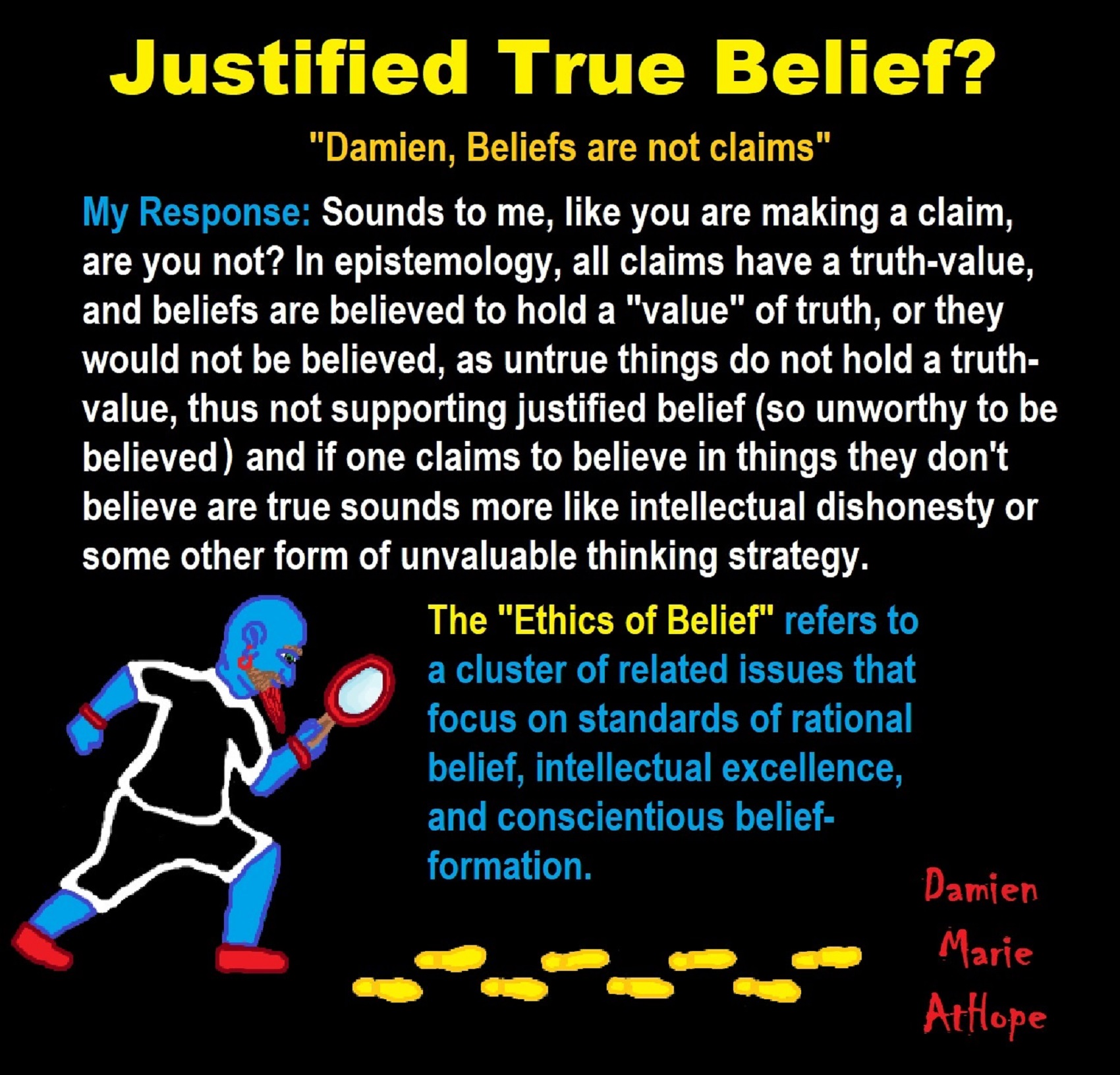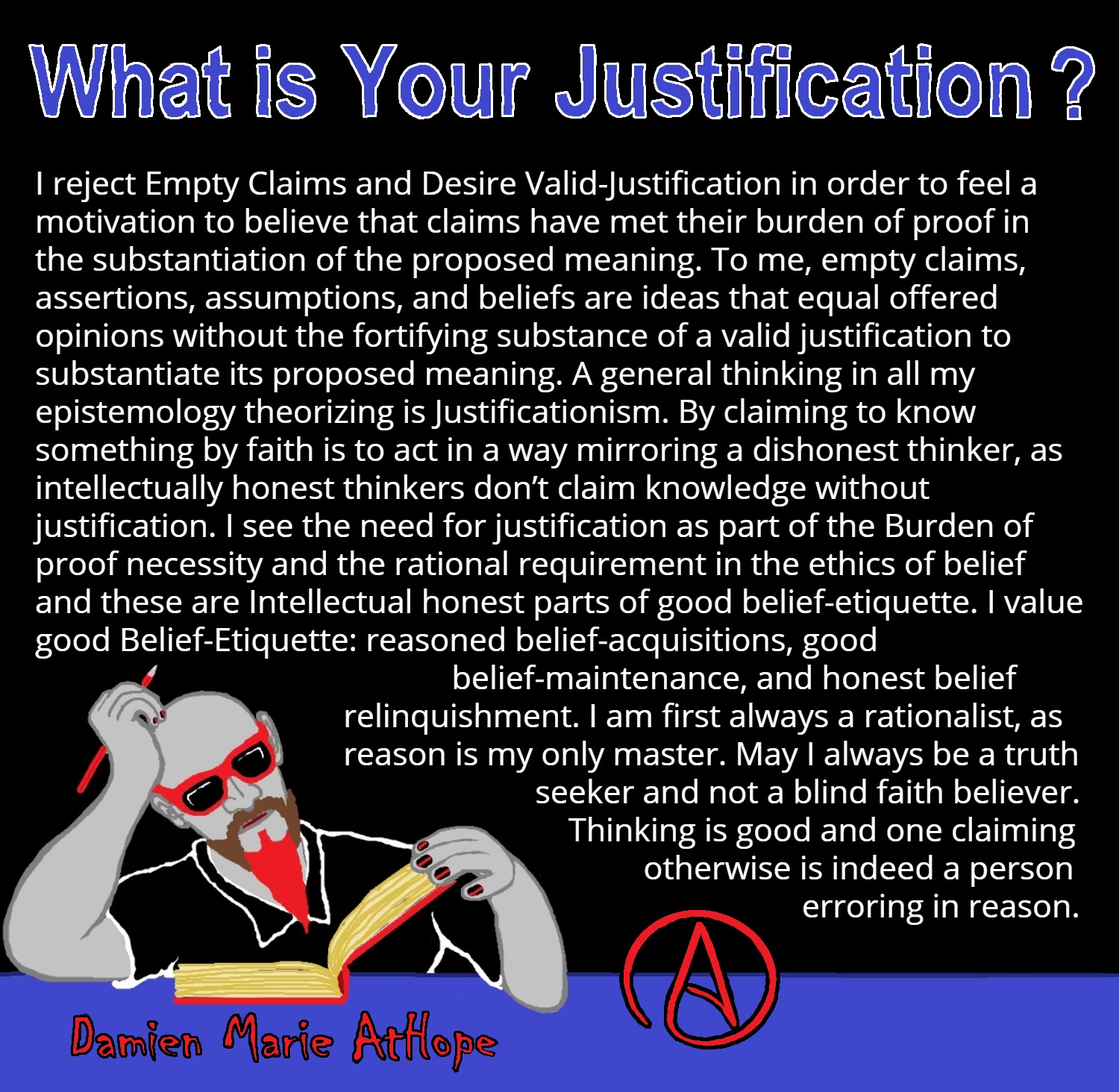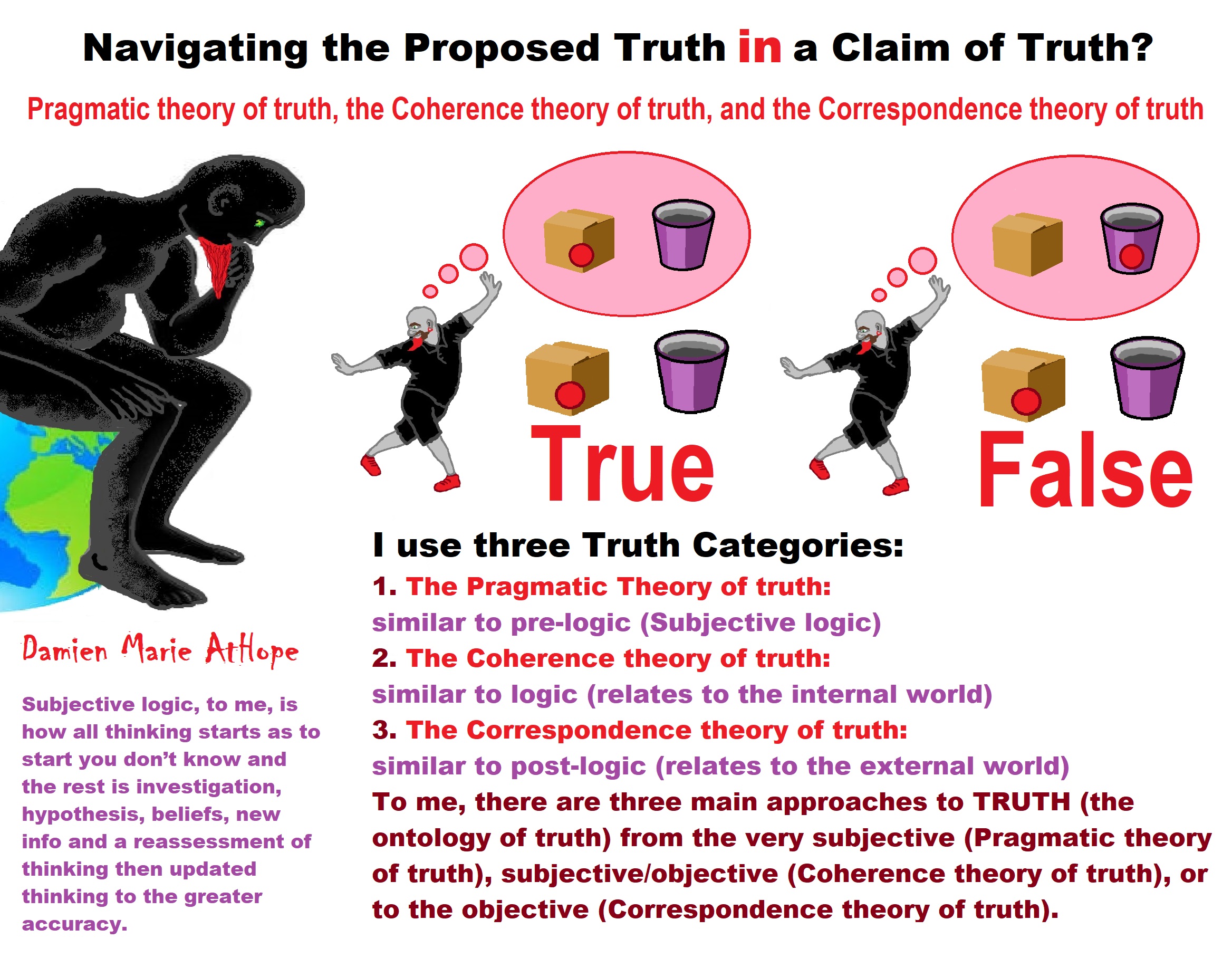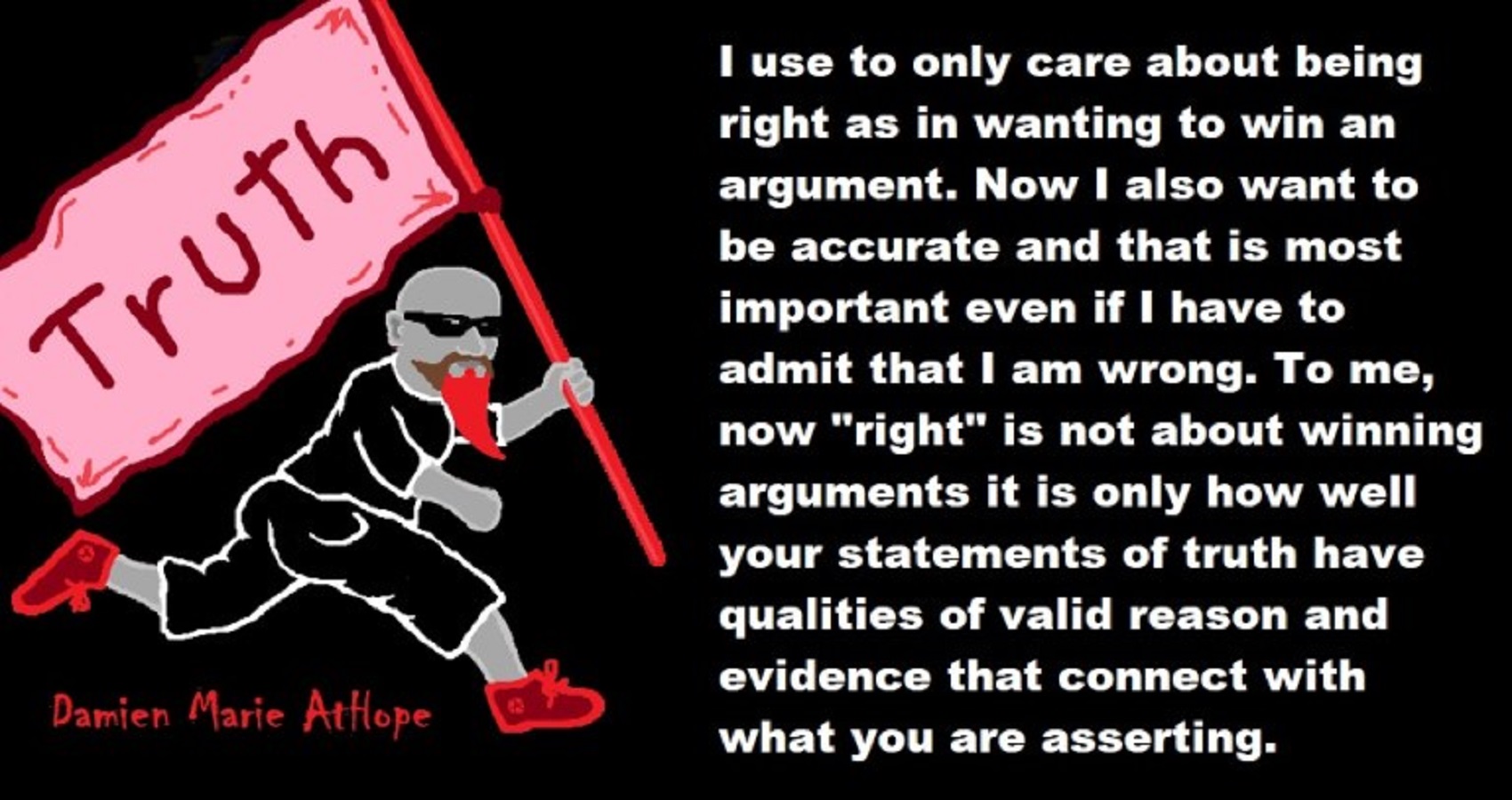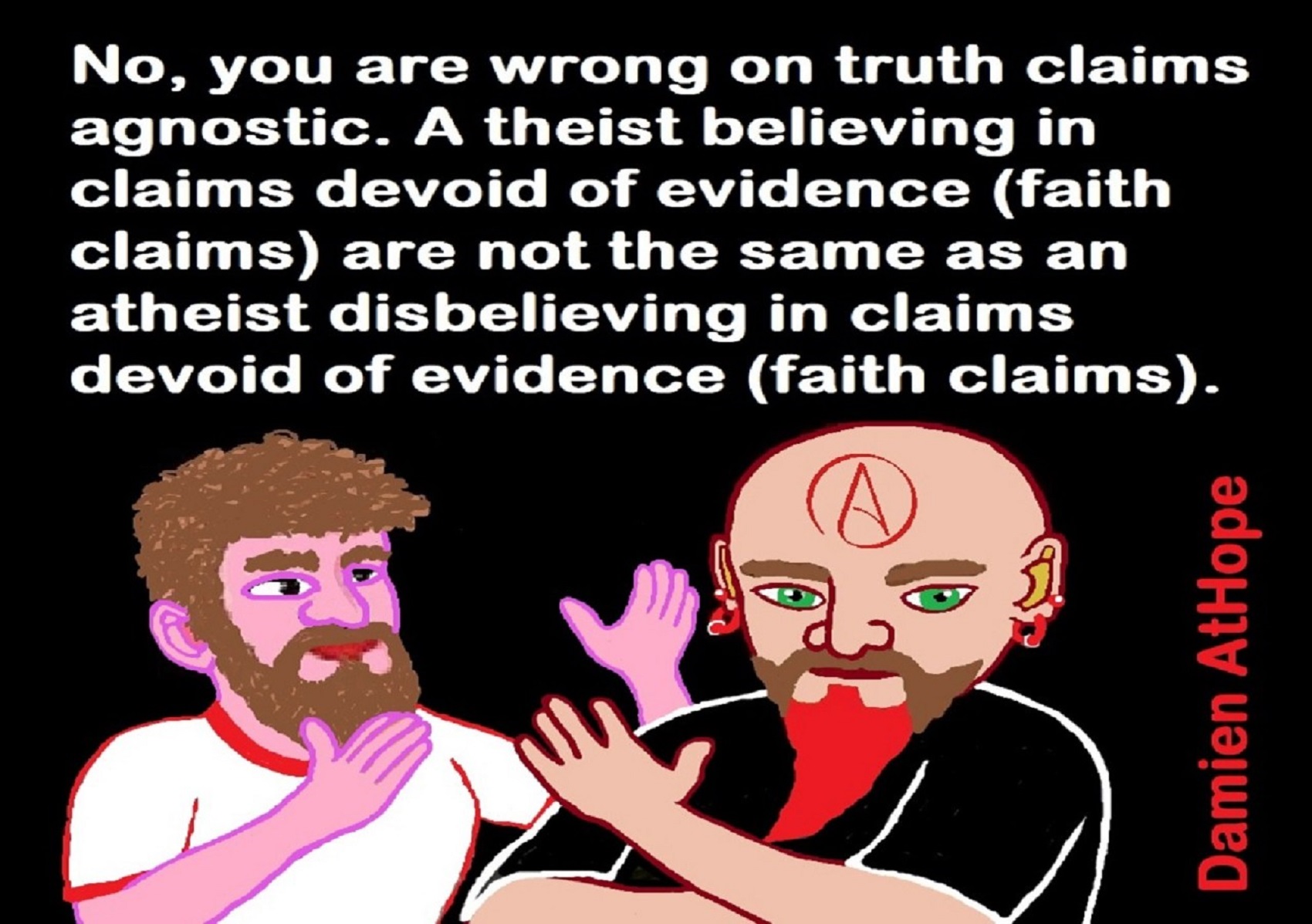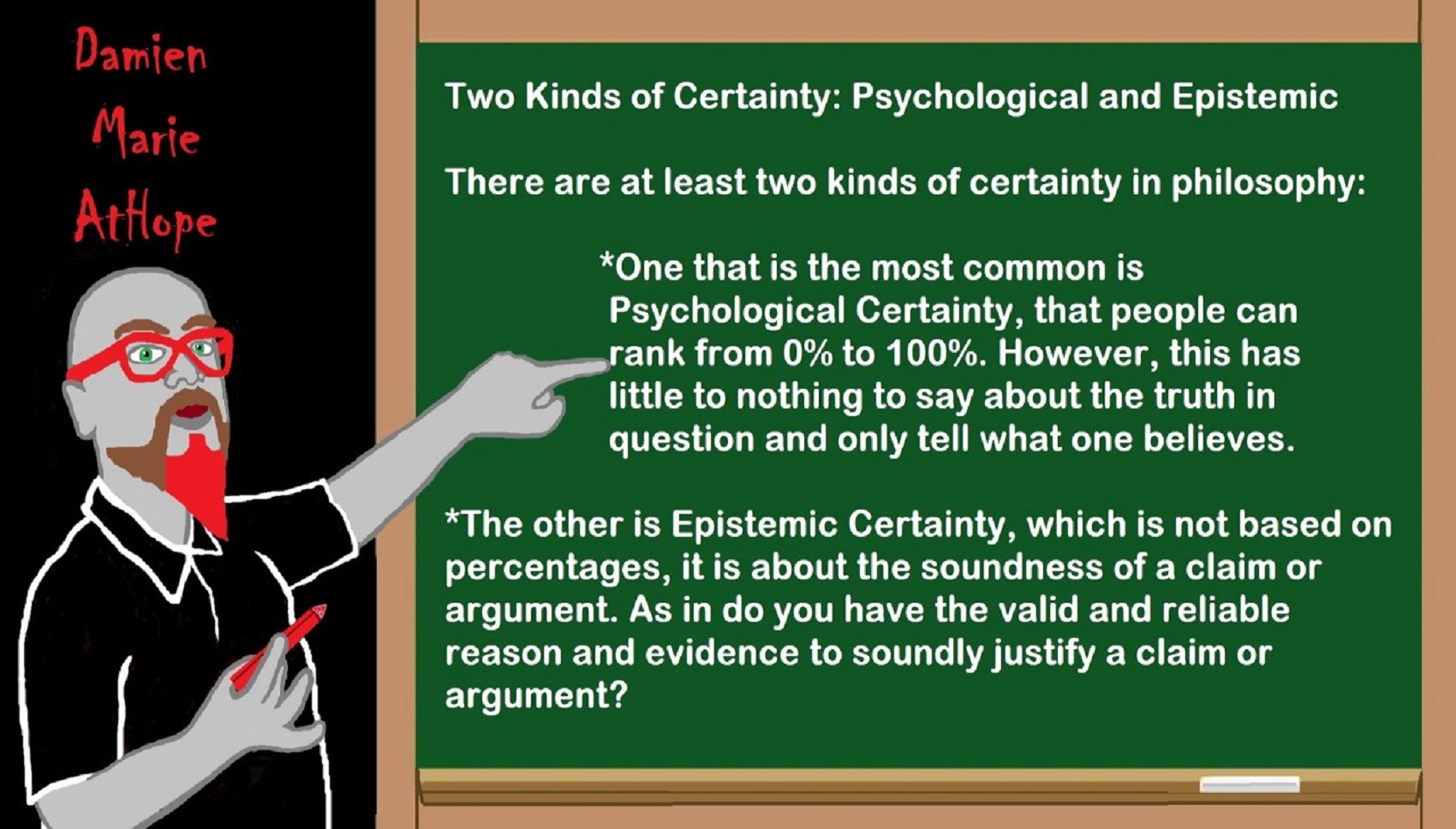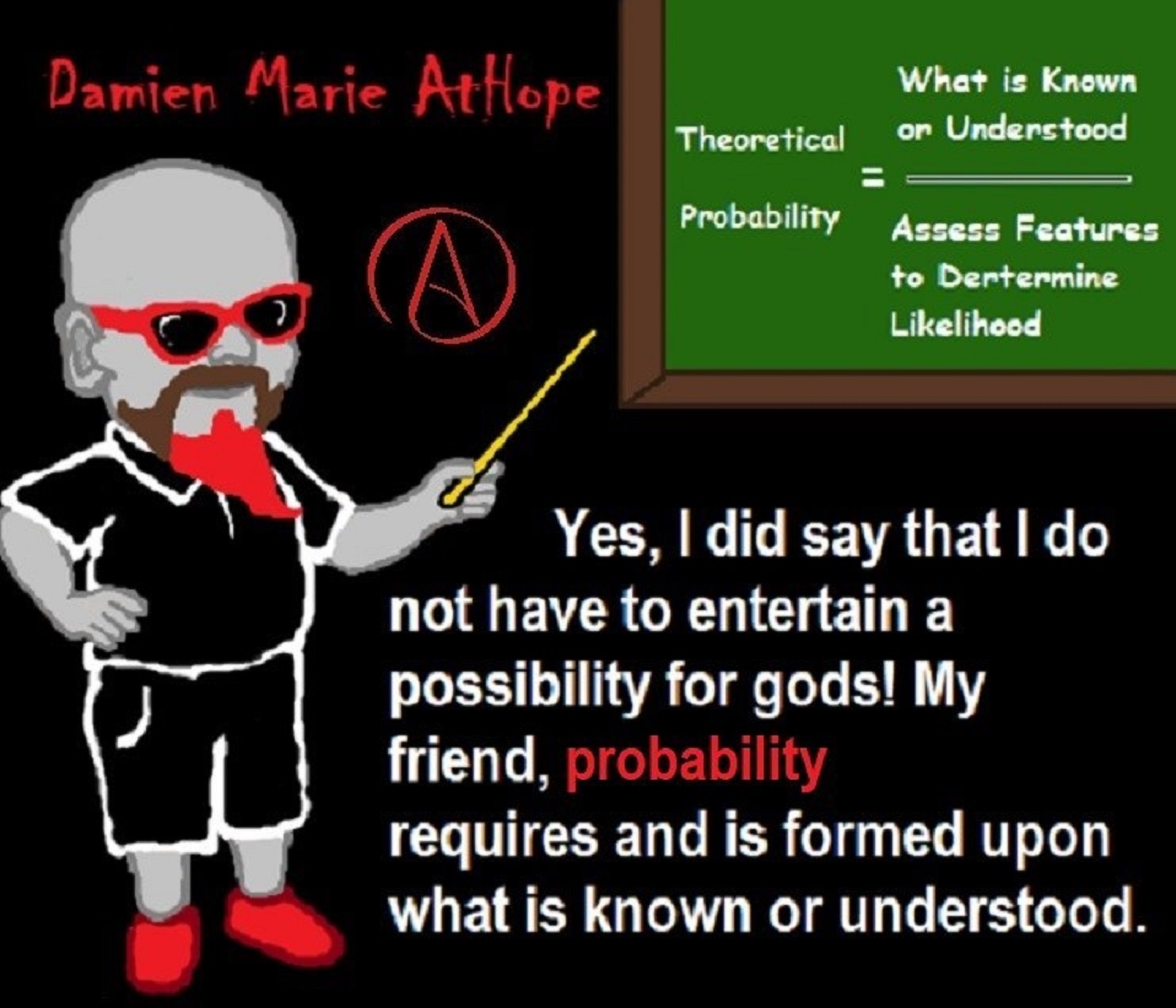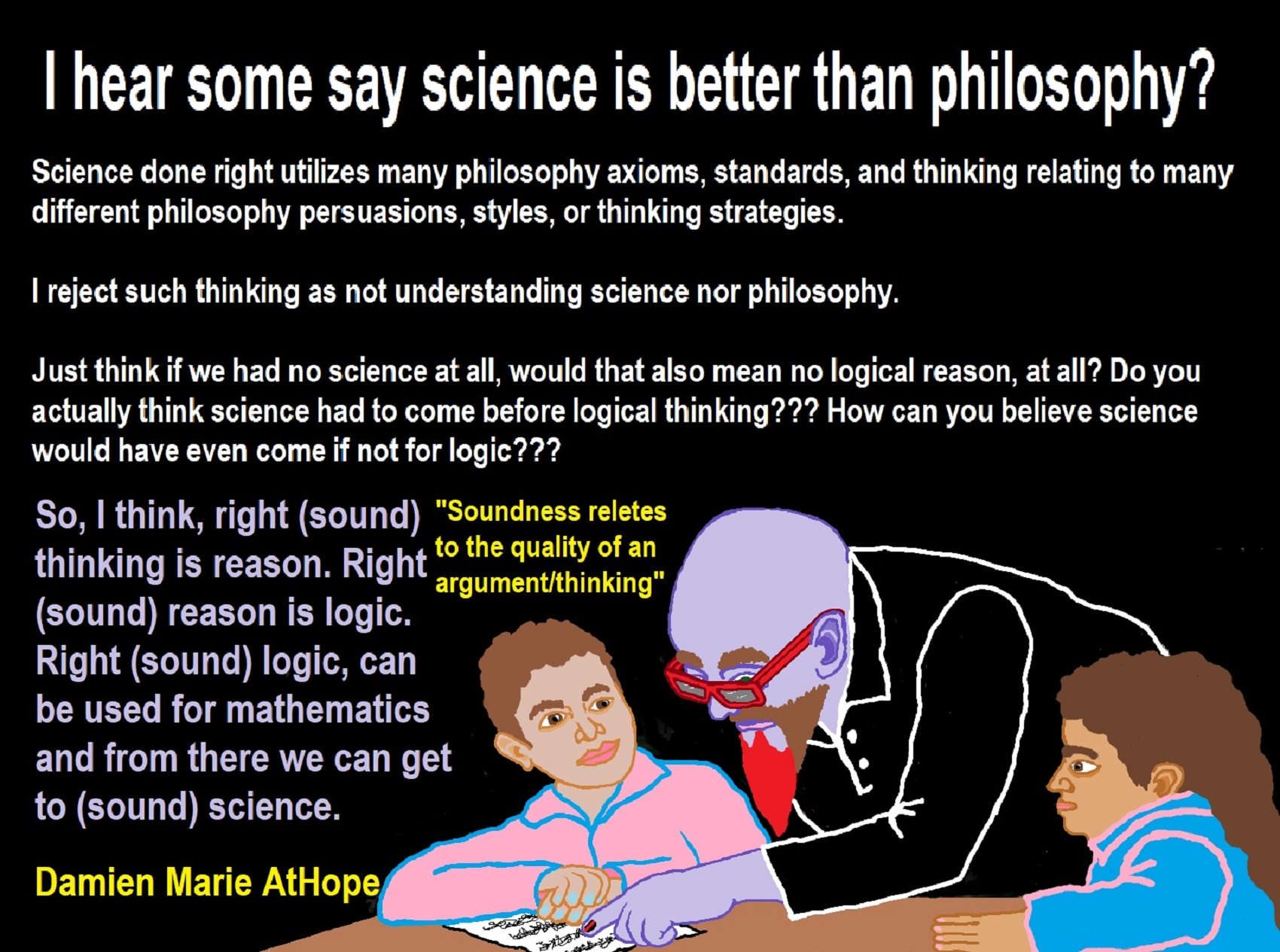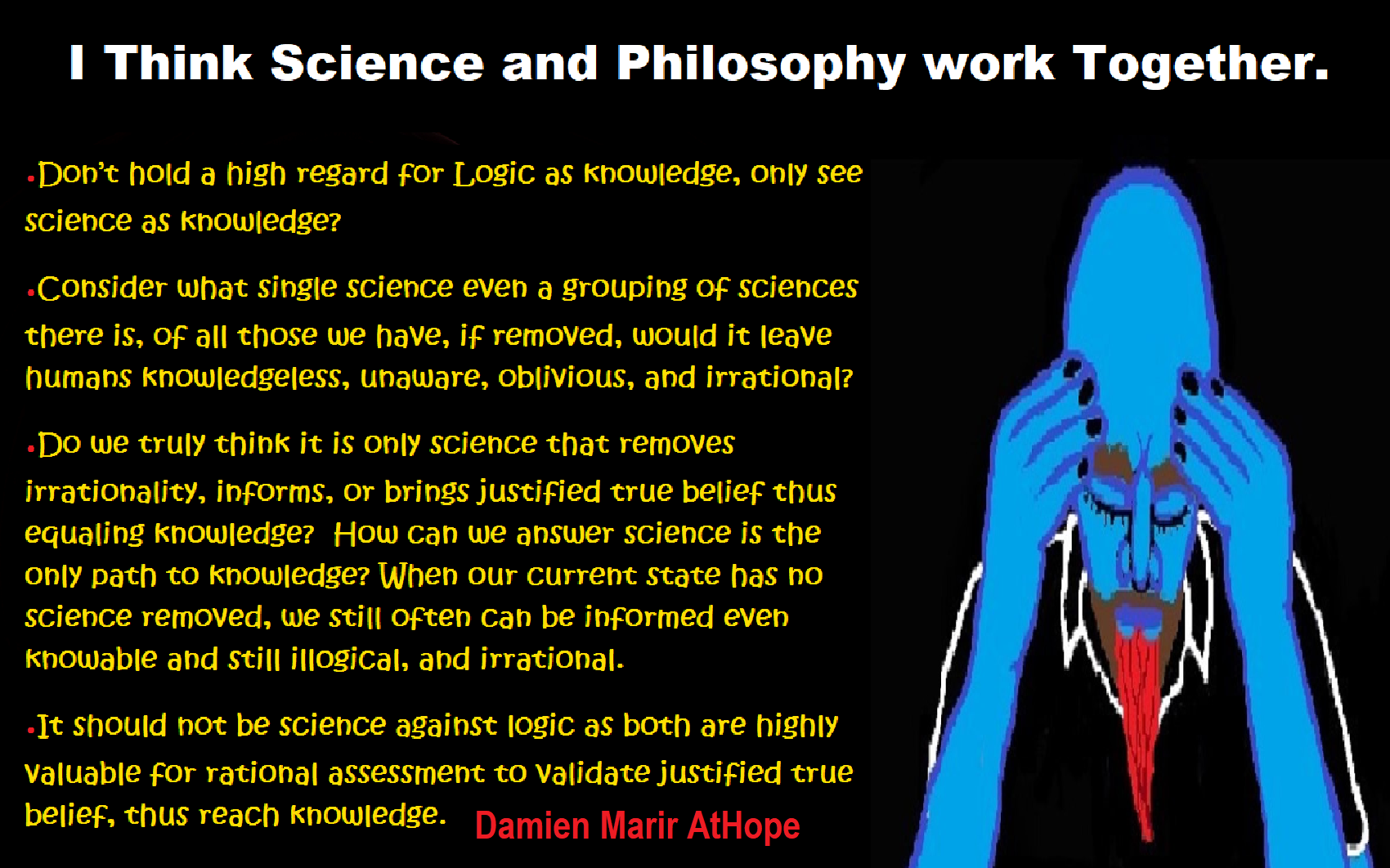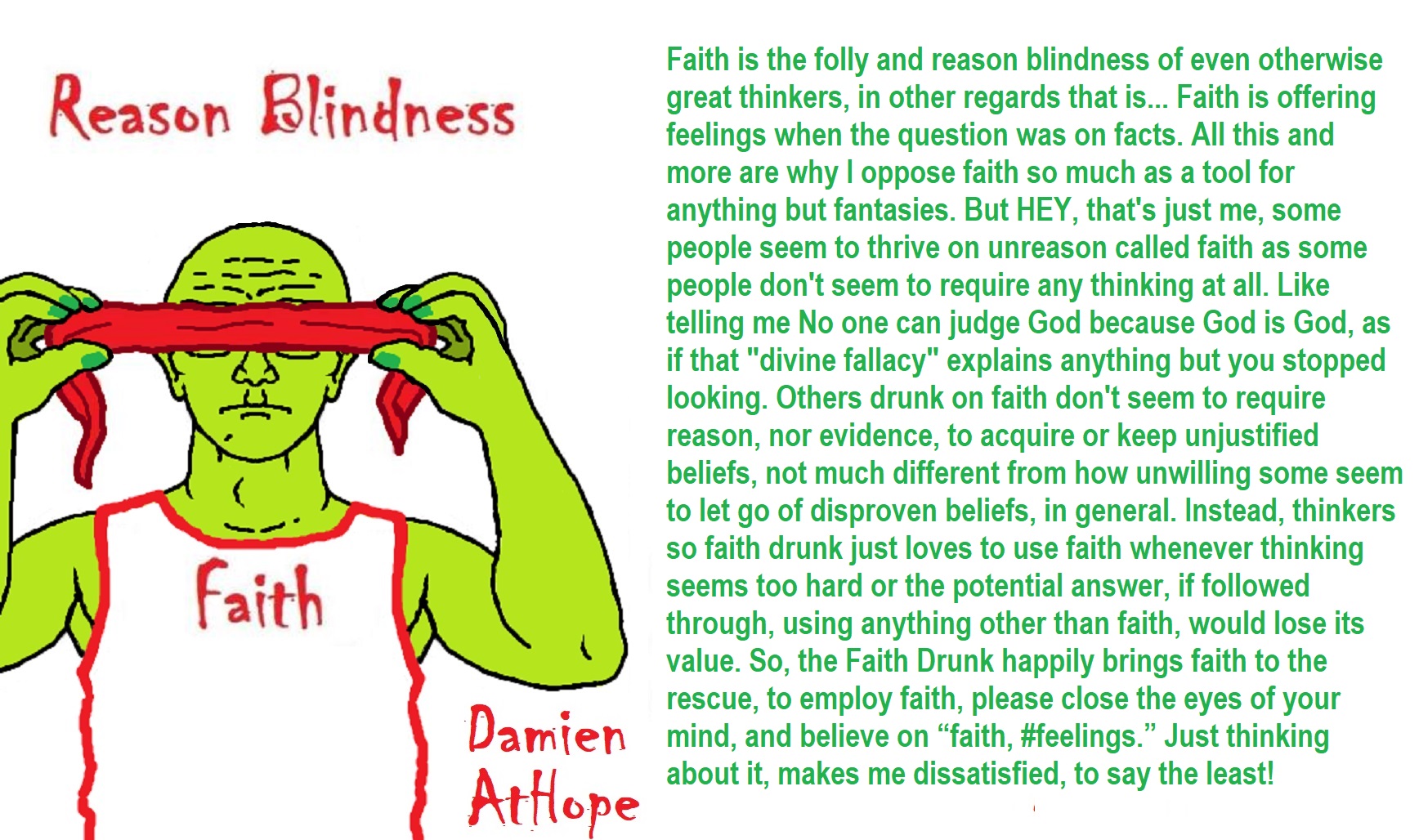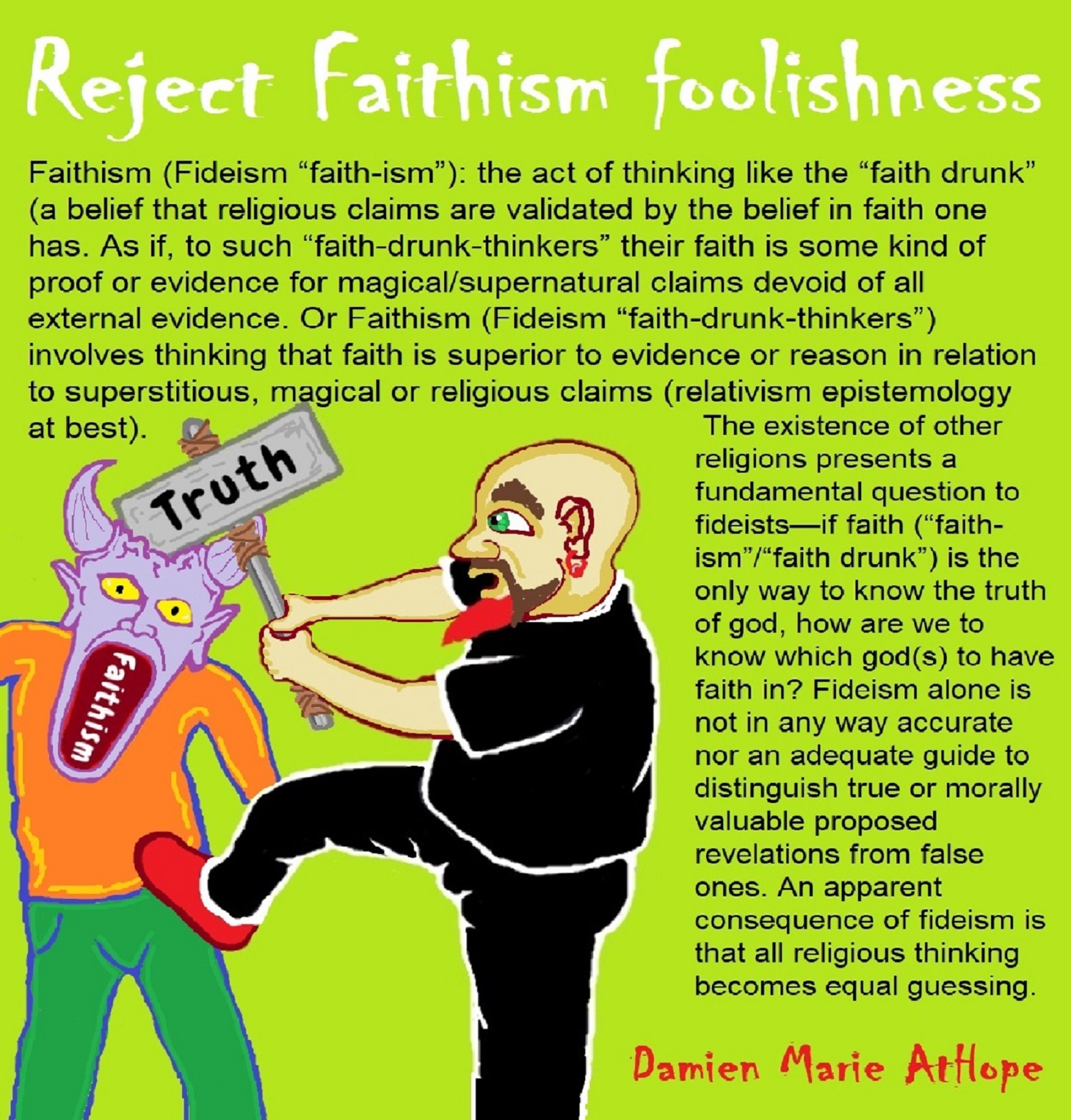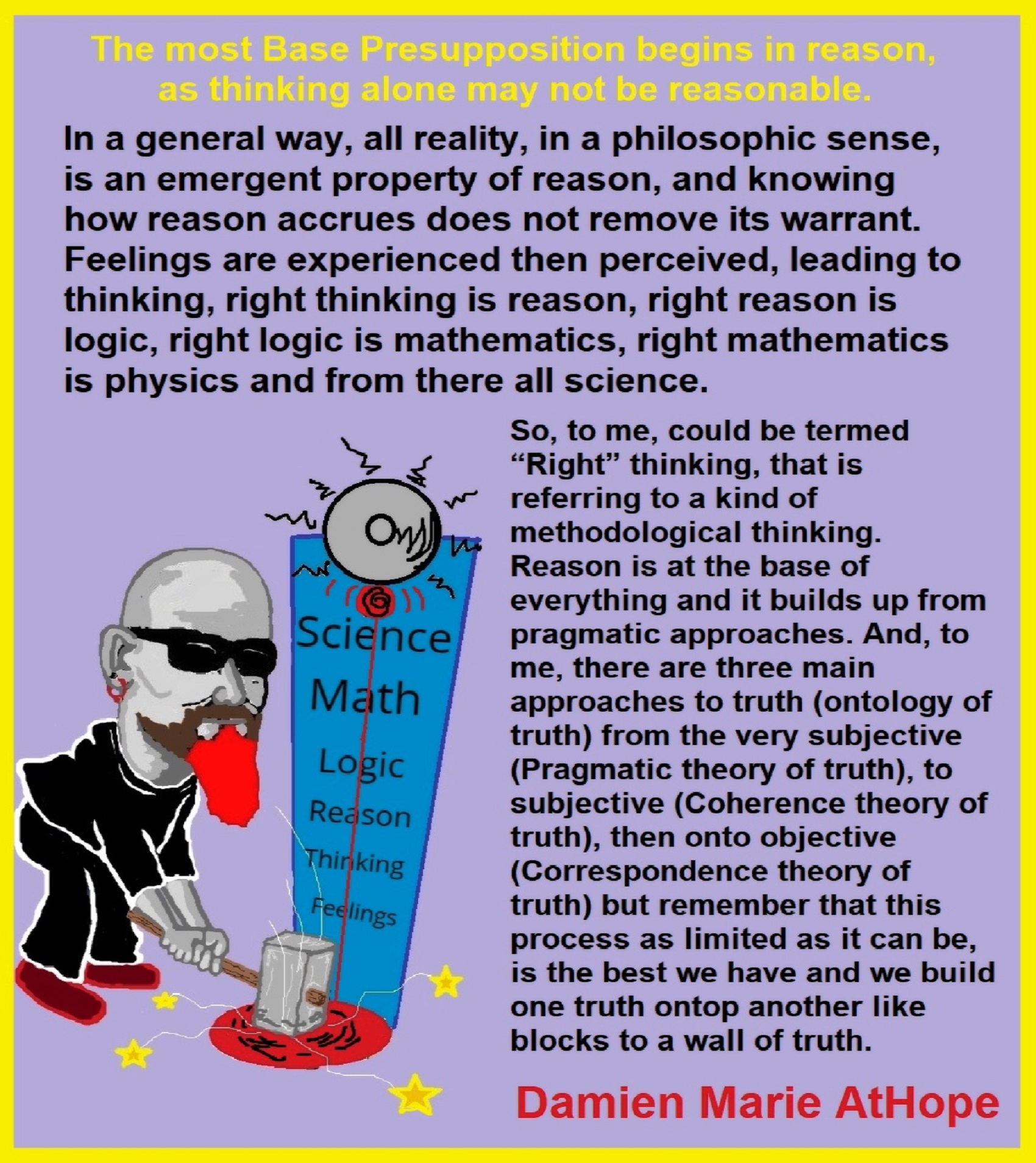
An honest thinker would want to know what is sufficient evidence for the reliability and validity to support a belief.
Beliefs should be open to revision, have been scrutinized before believing needing valid and reliable reason and evidence. But then you have most religious believers who accept beliefs with no proof at all just empty faith. Stubbornly they adhere to religious beliefs, which are either completely insufficiently proven beliefs at best and outright myths and lies otherwise. Such religious believers beliefs are not at all open to revision, either they are shallow thinkers that are quite flexible, and just how the beliefs were acquired so to the current religious go unscrutinized, just as the did before believing. And faith, the mental infection of clear thinking continues over requiring a scrutinizing of all things before believing, needing valid and reliable reason and evidence.
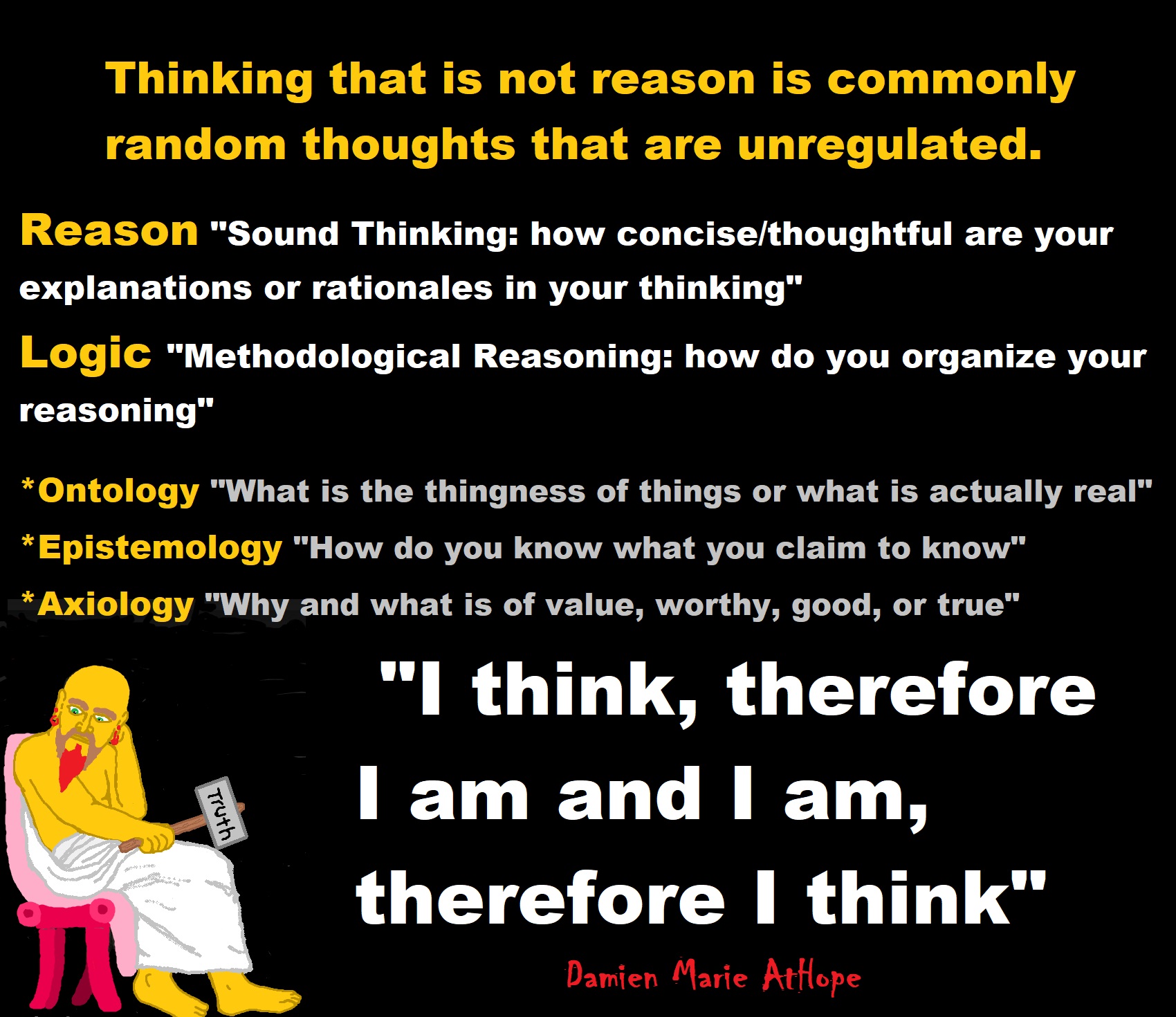
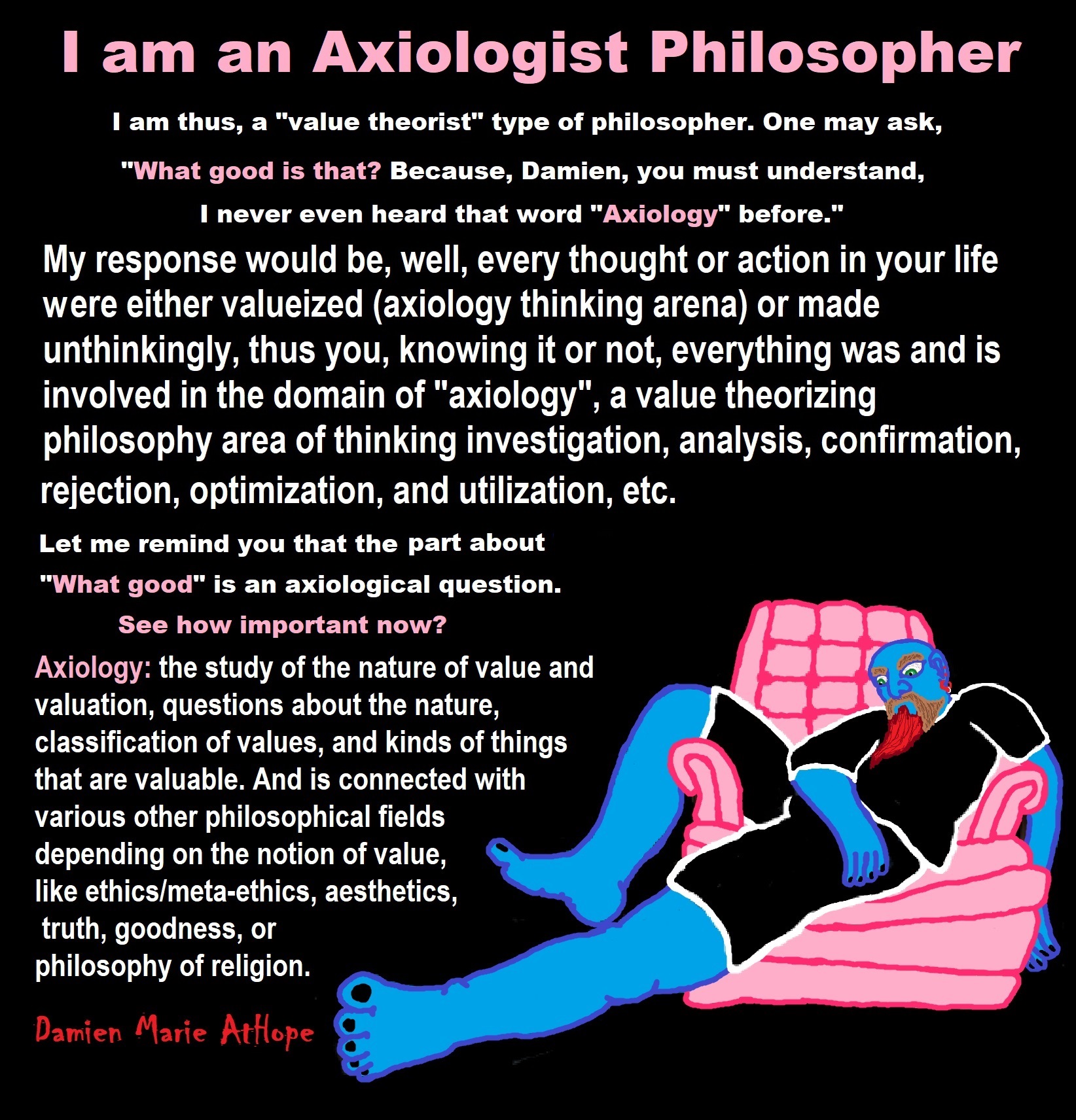
Truth is a Value (axiological) Judgment.
A fact is a statement that is consistent with reality or can be proven with evidence. The word “fact” derives from the Latin factum and was first used in English with the same meaning: a thing done or performed, a meaning now obsolete. The common usage of “something that has really occurred or is the case” dates from the middle of the sixteenth century. Fact is sometimes used synonymously with truth, as distinct from opinions, falsehoods, or matters of taste. ref
What makes a belief an epistemically justified belief?
Probability, best explanation, logical consistency, natural consistency, reliability, and the broadest possible view of plausibility, are some of the standards that must be met. ref
Facts are labels, just like truth, that we put on claims we think are proven somehow, in that assertions are believed to match the state of affairs (if you are making realistic assumptions from science then likely supported by the beliefs in Scientific realism), that generally promote the Correspondence theory of truth “similar to both Rationalism and Empiricism” or Coherence theory of truth “similar to just Rationalism” its all still epistemic property of beliefs, whether one’s claim is of knowledge or certainty.
A thinker who earnestly directs, analyses, and challenges their own beliefs is brave. For it is better to search not like one with a belief to prove, no, first one must drill down into the belief exposing any and all flaws and if there is be willing to address it and if needed remove it. And after doing so myself as a god believer, it was a difficult life choice leave Religion and all its thinking errors, but I realized was more valuable. Remember what is often forgotten, that certainty, like knowledge, are epistemic properties of beliefs. ref
How would we act is the point, we need to think differently than make-believe and must not turn to wishful thinking lacking reality or one championing a denial of reality or epistemic certainty as the difference from Non-theistic and Non-magical beliefs which mirror reality thus are not unreasonable. Rather championing reality or epistemic certainty Non-theistic and Non-magical beliefs often are an exhibition of intellectual honesty accepting the natural world as it presents itself, which is only natural, then why is that seen as so bad to so many in the world? Like, what if we leveled the full weight of reason in an intellectuall honest critique of our one’s own beliefs not leaving any free of rebuilding or disbelief.
If you are a religious believer, may I remind you that faith in the acquisition of knowledge is not a valid method worth believing in. Because, what proof is“faith”, of anything religion claims by faith, as many people have different faith even in the same religion?
“Damien, you say you don’t value faith but what you fail to realize in saying this is that almost everything we do requires some sort of faith.” – Challenger
My response, Wrong, wrong, wrong faith, is strong belief without evidence or contrary to evidence. I use reason: conjecture, inference or direct evidence no need for faith.
“Faith: firm belief in something for which there is no proof or strong religious feelings or beliefs.” ref
My response, To me, faith is strong belief without evidence or contrary to evidence. If you have no evidence you don’t form beliefs you can speculate unsupported possibilities in relation to what is known but not as a general rule, claim to believe. If one has little evidence it is then, to me, one can use conjecture and this is a low supported belief that should not be at all held as sufficient evidence for knowledge, rather a supported possibility. When we have more but not fully supported evidence for proof we can use inference offering a higher supported possibility offering a higher supported belief yet this too should not be at all held as sufficient evidence for knowledge nor generally epistemically rational beliefs.
But even then we must hold sound thinking involving “Belief-Etiquette” = reasoned belief-acquisitions, good belief-maintenance, and honest belief relinquishment. And always remember the challenge of fallibility, which extends even to our most deeply held beliefs, either to make it rational to be less than certain of belief conclusions or being open to honest belief relinquishment or adapting the belief to new evidence.
“Conjecture: an opinion or idea formed without proof or sufficient evidence or a conclusion deduced by surmise or guesswork.” ref
“Inference: the act or process of reaching a conclusion about something from known facts or evidence.” ref
“Epistemically rational beliefs: are an employing of epistemic rationality, roughly, the kind of rationality which one displays when one believes propositions that are strongly supported by one’s evidence and refrains from believing propositions that are improbable given one’s evidence. Moreover, epistemic rationality is that part of rationality which involves achieving accurate beliefs about the world. It involves updating on receiving new evidence, mitigating cognitive biases, and examining why you believe what you believe. It can be seen as a form of instrumental rationality in which knowledge and truth are goals in themselves. And among individuals who strongly value epistemic rationality traditionally, have been distinguished from practical rationality. In the view of many thinkers, to be epistemically rational, beliefs should approximate a number of ideas: coherence with the canons of logic, axioms of probability, and rules of evidential support. For, it is only then that beliefs are deserving of our trust. Lastly, epistemic rationality is about forming true beliefs, about getting the map in your head to accurately reflect the territory of the world. We can measure epistemic rationality by comparing the rules of logic and probability theory to the way that a person actually updates their beliefs” ref, ref, ref, ref
Here is epistemic rationality as it is stated by Anna Salamon on Rationality from the Center for Applied Rationality, “when cognitive scientists talk about rationality, one of the main things they’re talking about is epistemic rationality.” https://www.youtube.com/watch?v=7_DA-hbuafU
A good standard is to adhere beliefs to is epistemic rationality (a rational belief or knowledge forming possess) which has similarities to the correspondence theory of truth (a rational belief or knowledge forming possess requiring that they accurately relate to or describes (i.e., corresponds with) that real world as it presents itself. However, epistemic rationality is that part of rationality which involves achieving accurate beliefs about the world (i.e., corresponds with), but also good belief edicate, such as, assessment before belief acquisition, reassessing and if need be updating one’s beliefs once valid, sound and reliable to new evidence when it is received and examining why such a belief is needed, useful or an actual extension of knowledge.
Strong vs Weak Thinkers
A strong thinker can deeply analyze their own positions removing all that is unworthy and updating to the most currently accurate. Whereas a weak thinker can only offer deep attacks to the positions of others that differ in thinking. Just think, are your beliefs further supporting rhetoric or accuracy to the facts and are you ready to change if you have it the other way around?
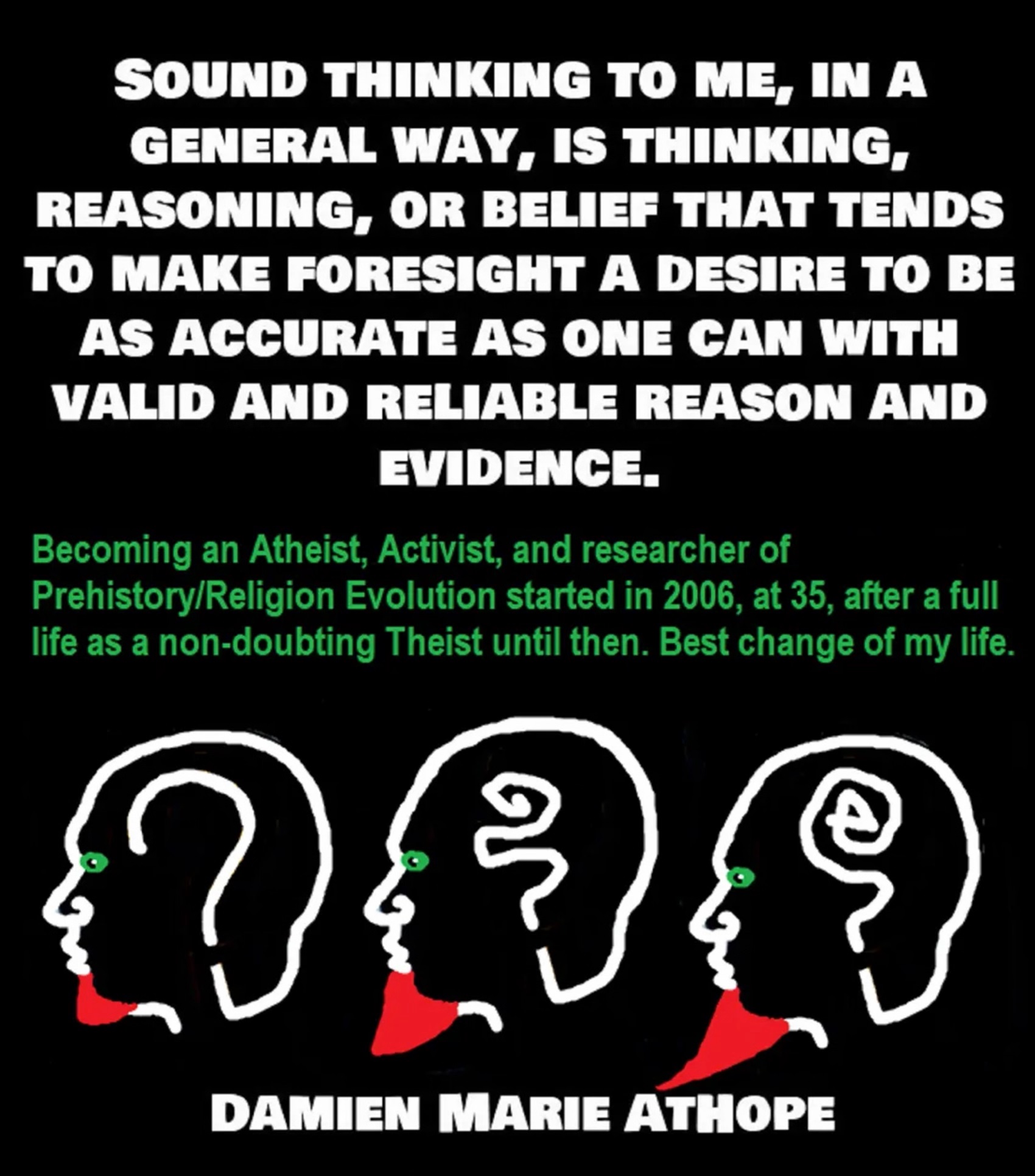
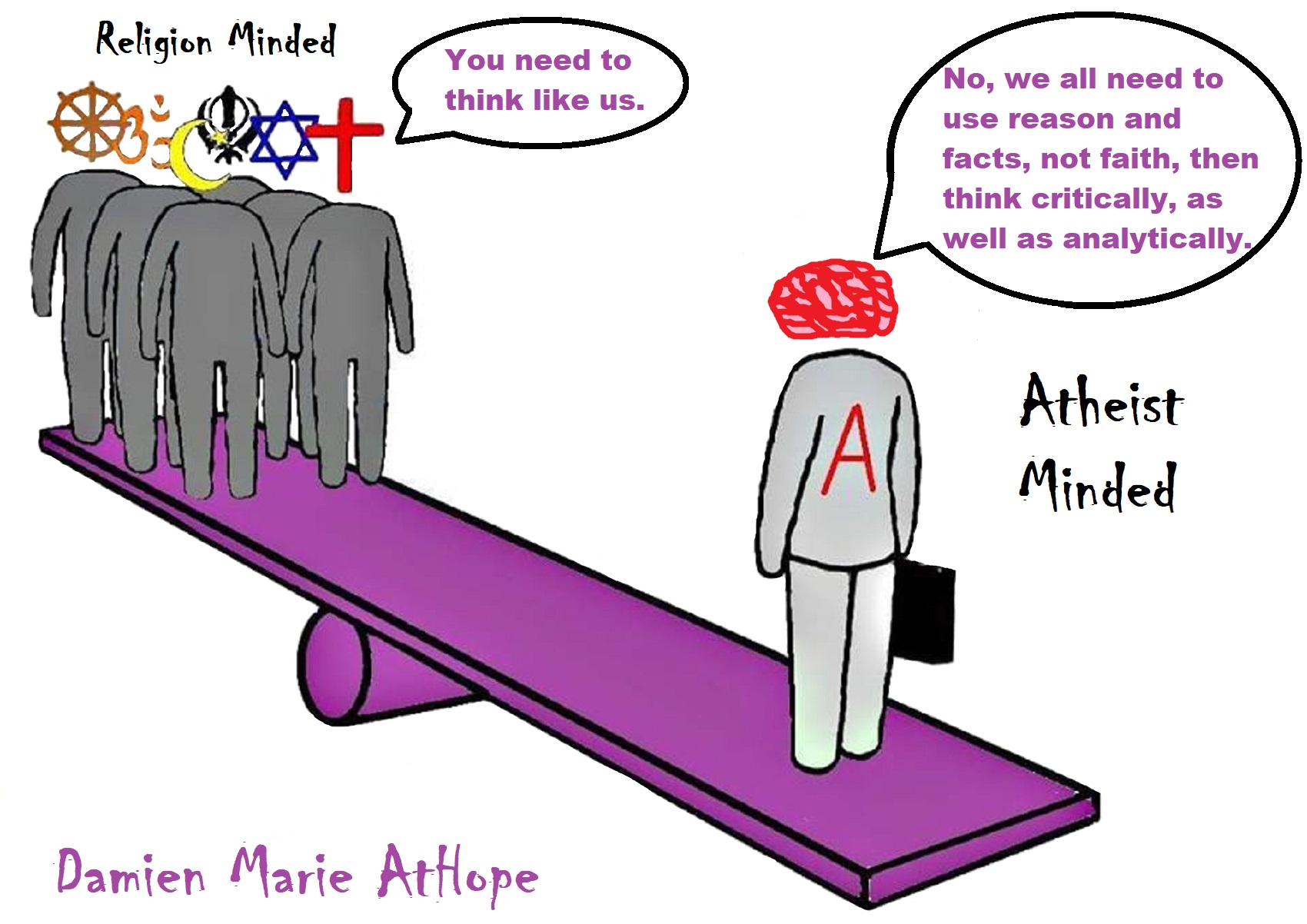
Faith (unthinking) Believer vs Justified Thinker
When you can, with all honesty, say that you put a similar voracity to one’s own ideas as they demand
We don’t like slow clear accurate thinking, no, we are often biased, irrational, and compulsive disordered hasty generalizations thinking beings, thus faith beliefs are common. We build our “belief” of the accuracy of our hasty generalizations one assertion at a time. In other words, we add undue increasing assurance because we keep saying it over and over again, not because it’s actually accurate to the facts. We may cherry-pick a few facts to support this error in thinking but that is intellectual dishonestly, as if it can be destroyed by the truth it should be.
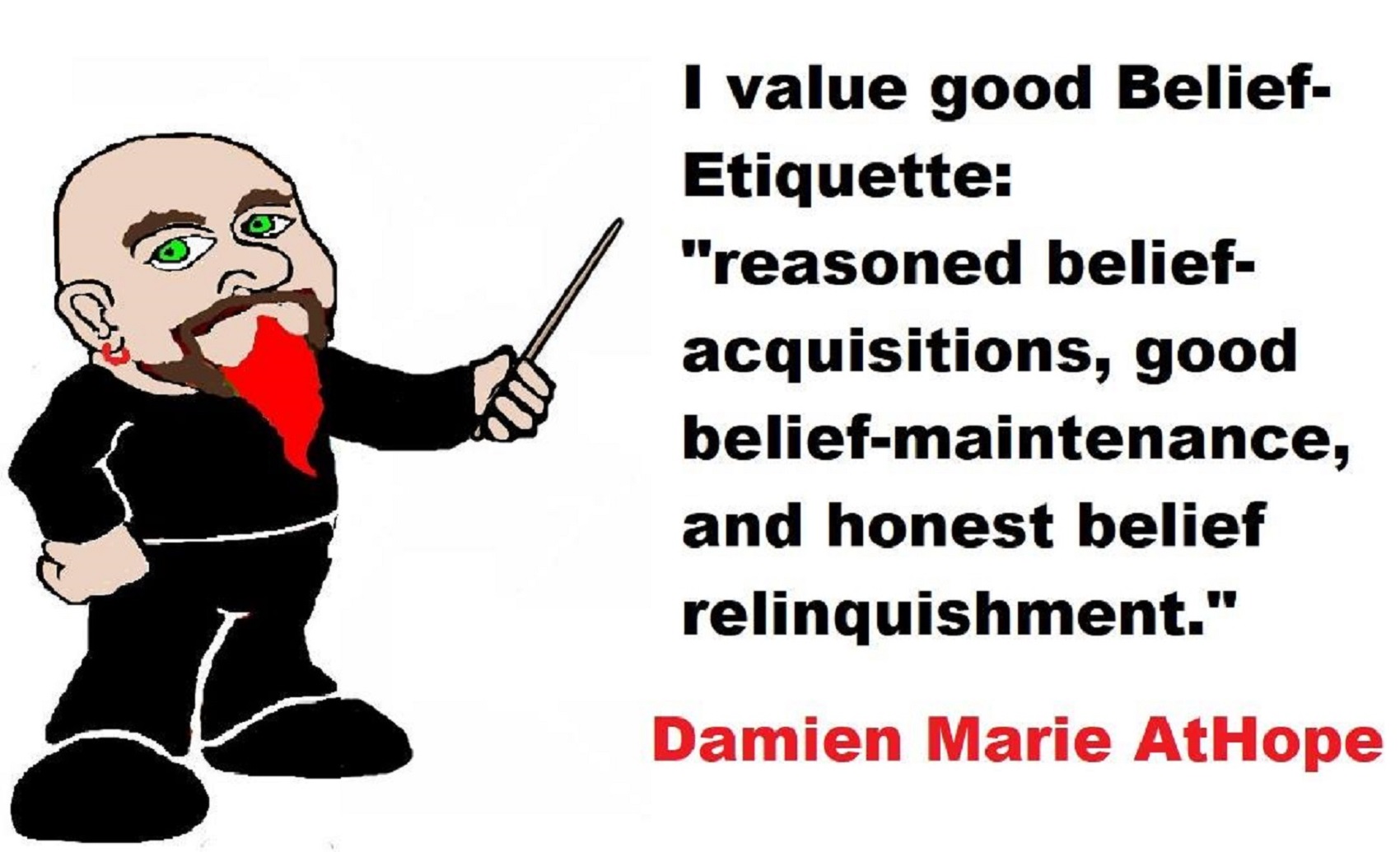
How can we silently watch as yet another generation is indoctrinated with religious faith, fear, and foolishness? Religion and it’s god myths are like a spiritually transmitted disease of the mind. This infection even once cured holds mental disruption which can linger on for a lifetime. What proof is “faith,” of anything religion claims by faith, as many people have different faith even in the same religion?
When you start thinking your “out, atheism, antitheism or antireligionism is not vitally needed just remember all the millions of children being indoctrinated and need our help badly. Ones who desperately need our help with the truth. Three things are common in all religions: “pseudo-science,” “pseudo-history,” and “pseudo-morality.”
And my biggest thing of all is the widespread forced indoctrination of children, violating their free choice of what to not believe or believe, I hate forced hereditary religion.
And, here is some information on hasty generalizations (also known as: argument from small numbers, statistics of small numbers, insufficient statistics, unrepresentative sample [form of], argument by generalization, faulty generalization, hasty conclusion [form of], inductive generalization, insufficient sample, lonely fact fallacy, over generality, Overgeneralization)
Description: Drawing a conclusion based on
Logical Form:
Sample S is taken from population P.
Sample S is a very small part of population P.
Conclusion C is drawn from sample S. Ref
Example #1:
My father smoked four packs of cigarettes a day since age fourteen and lived until age sixty-nine. Therefore, smoking really can’t be that bad for you. Ref
Explanation: It is extremely unreasonable (and dangerous) to draw a universal conclusion about the health risks of smoking by the case study of one man.
Example #2:
Four out of five dentists recommend Happy Glossy Smiley toothpaste brand. Therefore, it must be great. Ref
Explanation: It turns out that only five dentists were actually asked. When a random sampling of 1000 dentists
Exception: When statistics of a larger population are not available, and a decision must be made or opinion formed if the small sample size is all you have to work with, then it is better than nothing. For example, if you are strolling in the desert with a friend, and he goes to pet a cute snake, gets bitten, then dies instantly, it would not be fallacious to assume the snake is poisonous. Ref
Tip: Don’t base decisions on small sample sizes when much more reliable data exists. Ref
Variation: The hasty conclusion is leaping to a conclusion without carefully considering the alternatives — a tad different than drawing a conclusion from too small of a sample. Ref
Critical or Analytical Thinking and Suspension of Judgment, Disbelief or Belief
To me, it comes down to the question, would you be intellectually honest enough to want to know if your belief was completely false? And once knowing it was an unjustified belief, realize it lacks warrant and the qualities needed for belief-retention, as well as grasp the rationality that compels belief-relinquishment due to the beliefs insufficient supporting reason and evidence. The act of believing, just because one wants to
I am not just an Atheist (disbelieving claims of gods), an Antitheist (seeing theism as harmful) and an Antireligionist (seeing religion as untrue and/or harmful). I am also a Rationalist, valuing and requiring reason and evidence to support beliefs or propositions as well as I
A General Thinking in all My Epistemology Theorizing is Justificationism
A general thinking persuasion in all belief-acquisitions tend to use “My Ontology, Epistemology, and Axiology theorizing” involves some expression of Justificationism. As in, I require a worthy argument, that is justified with a good warrant(s), quality rich with valid and reliable reason and evidence that is connected to the accuracy of the truth claimed.
People all the time talk about, “I believe” in regards to religion and gods. No, likely you never had a chance to first investigate all the facts then choose what to believe or not believe. You like everyone else raised in a religious house where indoctrinated to the same religion your family held before your birth.
So you did not so much “believe” as “give in and slavishly agreed” to what you were told. Thus, you are more rightly called an agreer then a believer, especially when you don’t read the holy book you say you totally believe in.
It seems to me, religious believers are usually ignorant of the truth or willfully uninformed, foolish or indoctrinated to keep believing these conspiracy theories of reality that religions are with their magic claims, when presented with the facts and stupid or brainwashed to keep believing when they realize that the beliefs they have contained falsehoods, inaccurate information, or lies.
Trying to Help Promote Knowledge: Philosophy and Science.
Dogmatic–Propaganda vs. Disciplined-Rationality
Belief-Etiquette
I value good Belief-Etiquette: reasoned belief-acquisitions, good belief-maintenance, and honest belief relinquishment. I am first always a rationalist, as reason is my only master. May I always be a truth seeker and not a blind faith believer. Thinking is good and one claiming otherwise is indeed a person erroring in reason. Which may I remind you is terrible since the most Base Presupposition in our understanding of everything begins in reason.
What we generally call “truth” is a “value judgment” of what we believe is the reality of the case. So, a claim of truth then like all claims needs some type supporting justification. The claim of truth’s integrity requires testing of what the theme of the offered truth involves if validly justified it should not be distrusted. However, if the claim of truth’s integrity is not justified then the term “Truth” has not been itself attacked rather it’s the using the word “Truth” that cannot substantiate the term that it should be distrusted because it is seemingly in error or a lie-pseudo truth. Therefore, the user/claimer of the improper use of the word “Truth” but believe in and promote pseudo-truth because it does not have a sound basis in logic or fact demonstrate the validity and reliability of their truth assertion.
So, I love truth, its claims of the term “Truth” with no justification that I can’t stand because such claims are pseudo-truth. It’s like how science as a term is quite corrupted by pseudoscience right? Yes and No. Yes, because fake science is believed as real science where the user/claimer of the improper use of the word “Science” believe in and promote pseudo-science but because it does not have a sound basis in logic or fact demonstrate the validity and reliability of their truth assertion. However, we can know science from pseudoscience as the term is given other methodological structure to which to evaluate then prove true science or prove a claim as not science and in fact pseudoscience so to do we sadly have to a methodological structure to prove a claim as not truth and in fact pseudo-truth.
Sound thinking (soundness arguments and statements) as it relates to philosophical thinking.
“Soundness: a property of both arguments and the statements in them, i.e., the argument is valid and all the statement
From: An Introduction to Critical Thinking and Creativity: Think More, Think Better
by J. Y. F. Lau (Author) 9.1 VALIDITY AND SOUNDNESS
Validity is a most important concept in critical thinking. A valid argument is one where the conclusion follows logically from the premises. But what does it mean? Here is the official definition: ‘An argument is valid if and only if there is no logically possible situation in which the premises are true and the conclusion is false.’ To put it differently, whenever we have a valid argument, if the premises are all true, then the conclusion must also be true. What this implies is that if you use only valid arguments in your reasoning, as long as you start with true premises, you will never end up with a false conclusion. Here is an example of a valid argument:

This simple argument is obviously valid since it is impossible for the conclusion to be false when the premise is true. However, notice that the validity of the argument can be determined without knowing whether the premise and the conclusion are actually true or not. Validity is about the logical connection between the premises and the conclusion. We might not know how old Marilyn actually is, but it is clear the conclusion follows logically from the premise. The simple argument above will remain valid even if Marilyn is just a baby, in which case the premise and the conclusion are both false. Ref
If you are a religious believer, may I remind you that faith in the acquisition of knowledge is not a valid method worth believing in. Because, what proof is “faith”, of anything religion claims by faith, as many people have different faith even in the same religion?
Sound Thinkers vs. Shallow Thinkers
A shallow thinker quickly talks, often with boastful postulations, likely just as often are pushed strongly and loudly as if this adds substance, and they do this before fully understanding what’s is really involved or if actually confirmed as true or have a high likely hood to be soundly justified. Whereas, a Sound Thinker are truth seekers of actually confirmed as truth or things that have a high likelihood to be soundly justified. Thus, often a Sound Thinker first poses Questions to understand slowing down and assessing all the facts or factors involved and then builds their argument or ideas. Just remember a simple rule all beliefs need something to support them or they are at best unsupported accepted assertions, arguments or ideas. At worst completely baseless, misinterpreted confusions, or outright falsehoods. See it’s like this, if one feels something requires faith (unsupported cognition of acceptance) to see the thing as real; without realizing it, one has affirmed that such a thing is not likely a true part of reality.
A Sound Thinker: uses disciplined rationality
A Shallow Thinker: undisciplined, situational, sporadic, or limited thinking.
More than just atheists I hope my thinking inspires people to be rationalists who strive to use critical thinking putting reason at the forefront thus as their only master even over their ego. As well as from such thoughtfulness may we all see the need for humanism and secularism, respecting all as helpful servant leaders assisting others as often as we can to navigate truth and the beauty of reality. I strive to be and wish for others to be more than just atheists, may we all aspiring to the greatness of being strong reasoned thinkers with truly strong hearts of kindness.
Long ago I only cared about “myself”, what a foolish time of my life. I once was afraid to champion kindness fearing I would look weak. Now I see the bravery of kindness and the weakness of hate.
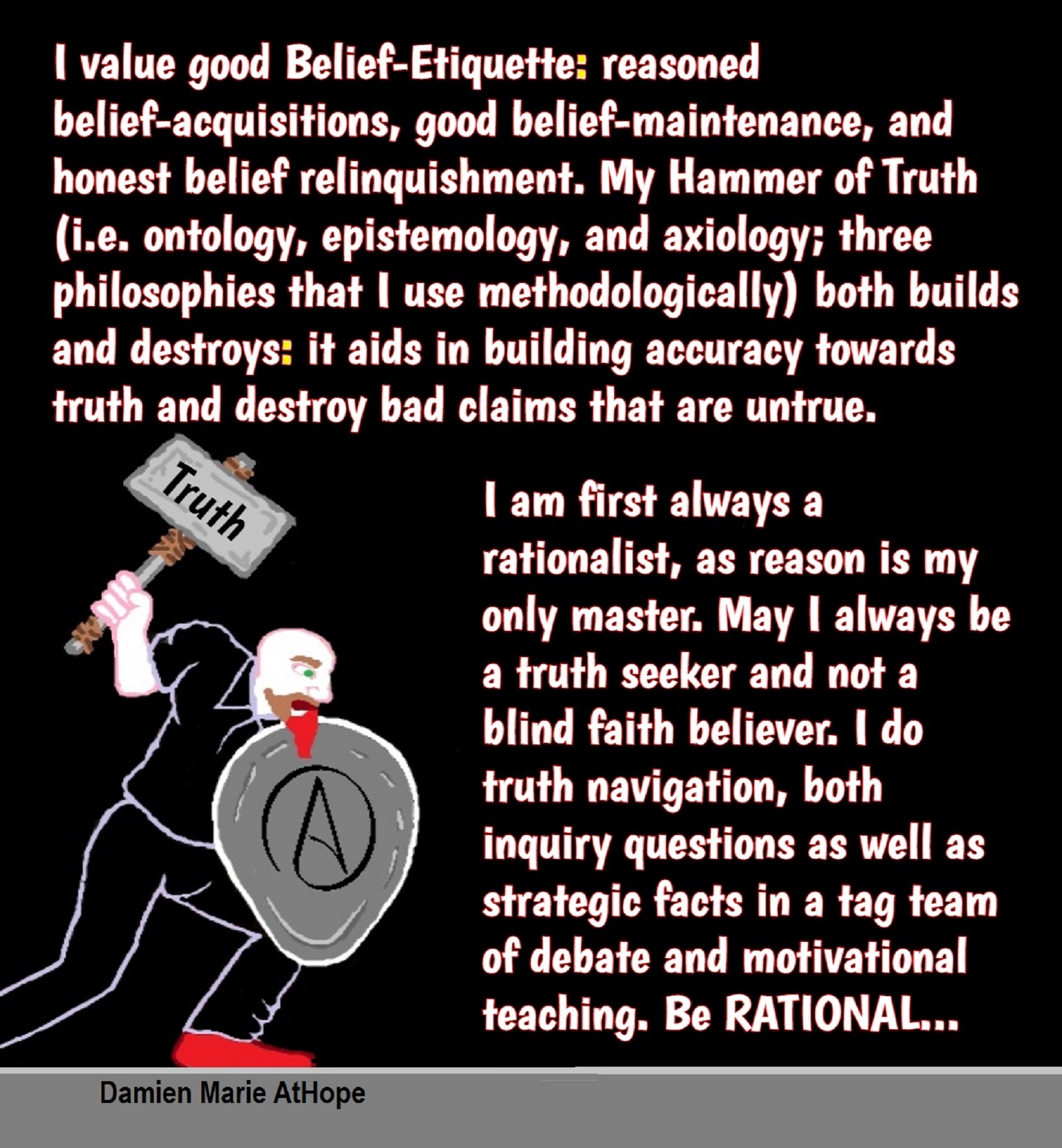
I do truth navigation, both inquiry questions as well as strategic facts in a tag team of debate and motivational teaching.
Truth Navigation: Techniques for Discussions or Debates
Truth Navigation and the fallacy of Fideism “faith-ism”
Compare ideas not people, attack thinking and not people. In this way, we have a higher chance to promote change because it’s the thinking we can help change if we address the thinking and don’t attack them.
My eclectic set of tools for my style I call “Truth Navigation” (Techniques for Discussions or Debates) which involves:
*REMS: reason (rationalism), evidence (empiricism), and methodological “truth-seeking” skepticism (Methodic doubt) (the basic or general approach)
*The Hammer of Truth: ontology, epistemology, and axiology (methodological use of philosophy)
*Dialectical Rhetoric = truth persuasion: use of facts and reasoning (motivational teaching)
*Utilizing Dignity: strategic dignity attacks or dignity enrichments (only used if confusion happens or resistance is present)
Asking the right questions at the right time with the right info can also change minds, you can’t just use facts all on their own. Denial likes consistency, the pattern of thinking cannot vary from a fixed standard of thinking, or the risk of truth could slip in. Helping people alter skewed thinking is indeed a large task but most definitely a worthy endeavor.
I have been asked before, how can I stand to deal with illogical, ones lacking critical thinking, the unreasonable, misinformed but fully believe, deliberately uninformed or deluded people, often so kindly? Well, I believe in others, or at least their ability to reason even if you don’t know how or are not paying attention currently. I can do deal with most people as I am often fighting for them even if they only feel I am against them and it usually is not that hard to do with a heart of compassion, as I care for the future of humanity and people have value. And, if people don’t listen or grasp logic, I try something else like reasoning. If they will not listen or grasp reasoning,
I will try just getting them to think, maybe on something they can agree or they do understand trying to work them back to the rationalism they are not getting or are avoiding. Then, if I can get them to reason, I build that up to logic. If they don’t seem to get them to thinking or are trying to avoid I can draw them back to feelings, maybe on something they can agree or they do understand trying to work them back to thinking, then reasoning, and then finally back to logic with which they are not getting or are avoiding. In a general way, all reality, in a philosophic sense, is an emergent property of reason, and knowing how reason accrues does not remove its warrant. Feelings are experienced then perceived, leading to thinking, right thinking is
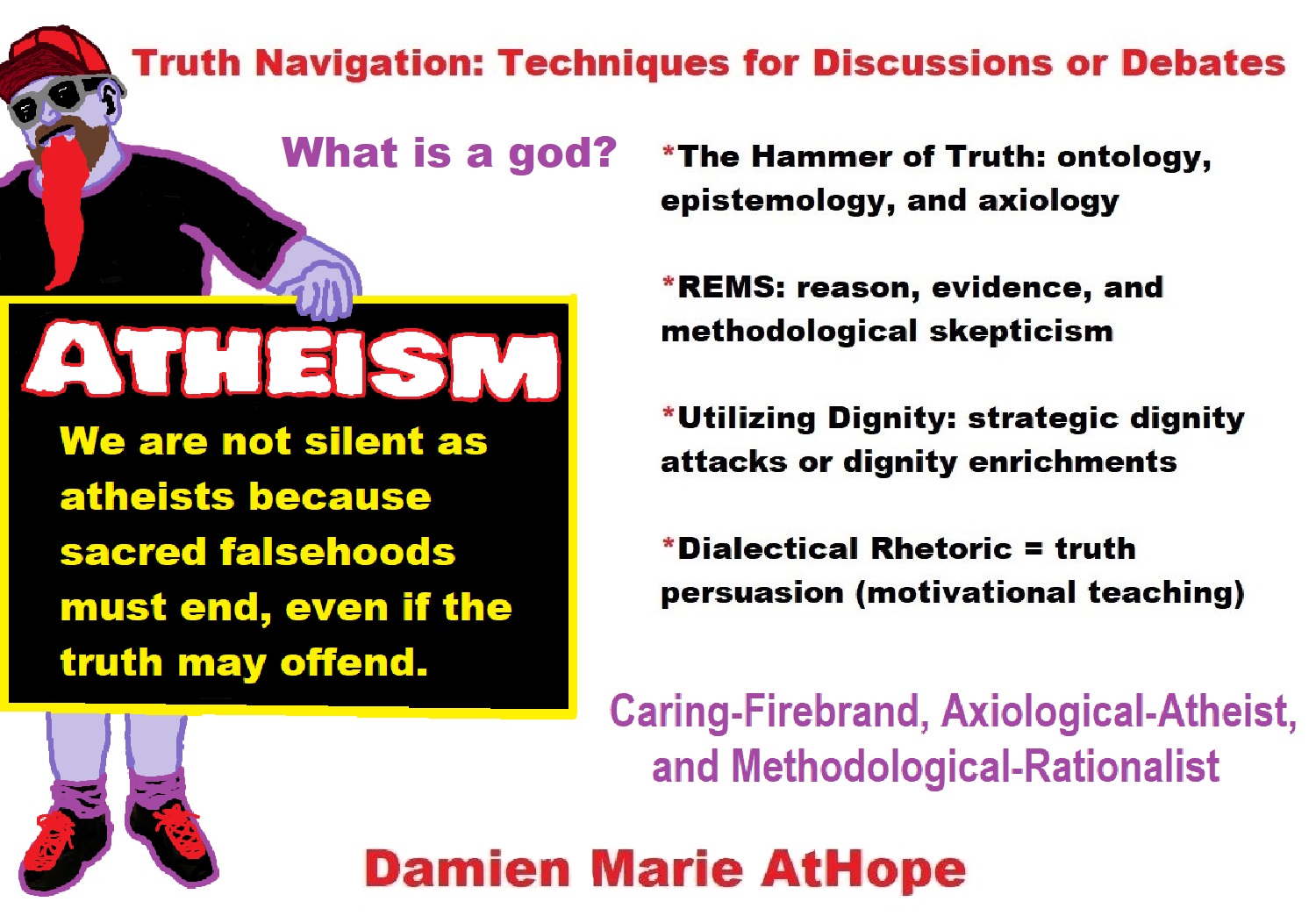
Here is why “Reason is my only master”
The most Base Presupposition begins in reason. Reason is needed for logic (logic is realized by the aid of reason enriching its axioms). Logic is needed for axiology/value theory (axiology is realized by the aid of logic). Axiology is needed for epistemology (epistemology is realized by aid of axiology value judge and enrich its value assumptions as valid or not). Epistemology is needed for a good ontology (ontology is realized by the aid of epistemology justified assumptions/realizations/conclusions). Then when one possesses a good ontology (fortified with valid and reliable reason and evidence) they can then say they know the ontology of that thing.
So, I think, right thinking is reason. Right reason is logic. Right logic, can be used for mathematics and from there we can get to science. And, by this methodological approach, we get one of the best ways of knowing the scientific method. Activating experience/event occurs, eliciting our feelings/scenes. Then naive thoughts occur, eliciting emotions as a response. Then it is our emotional intelligence over emotional hijacking, which entrance us but are unavoidable and that it is the navigating this successfully in a methodological way we call critical thinking or as In just call right thinking.
So, to me, could be termed “Right” thinking, that is referring to a kind of methodological thinking. Reason is at the base of everything and it builds up from pragmatic approaches. And, to me, there are three main approaches to truth (ontology of truth) from the very subjective (Pragmatic theory of truth), to subjective (Coherence theory of truth), then onto objective (Correspondence theory of truth) but remember that this process as limited as it can be, is the best we have and we build one truth ontop another like blocks to a wall of truth.
Pragmatic theory of truth, Coherence theory of truth, and Correspondence theory of truth
Some think they don’t have beliefs and in fact, the belief you don’t have beliefs, is, itself a belief. Thus, I wish to help people increase their philosophic accuracy by understanding beliefs and how the terms facts, truth, knowledge, certainty, as well as objective and how every one of them are labels that we believe in as “markers of accuracy” in one’s belief and the actual state of afters. In addition, how they are all still connected in that they are all epistemic properties of beliefs.
Yes, again facts are labels, just like truth, that we put on claims we think are proven somehow, in that assertions are believed to match the state of affairs (if you are making realistic assumptions from science then likely supported by the beliefs in science realism), that generally promote the Correspondence theory of truth “similar to both Rationalism and Empiricism” or coherence theory of truth “similar to just Rationalism” its all still epistemic property of beliefs, whether one’s claim is of knowledge or certainty.
Science is quite the opposite of just common sense. To me, common sense in a relative way as it generally relates to the reality of things in the world, will involve “naive realism.” Whereas, most of those who are scientific thinkers, generally hold more to scientific realism or other stances far removed from the limited common sense naive realism. Science is a multidisciplinary methodological quest for truth. Science is understanding what is, while religion is wishing on what is not.
Religion vs. Science, Don’t Confuse Beliefs
A basic outline of scientific epistemology: Science: Hypotheses (Rationalism/Deductive, Inductive, or Abductive Reasoning etc.) + Testing (Empiricism/Systematic Observation) – Checking for errors (Skepticism/Fallibilism) + Interpret/Draw a Conclusion (Rationalism/Deductive, Inductive, or Abductive Reasoning etc.) *if valid* = Scientific Laws (describes observed phenomena) or Scientific Theory (substantiated and repeatedly tested explanation of phenomena) = Justified True Belief = Scientific Knowledge = Epistemic Certainty supportive of correctability
*being epistemically certain, is believing a truth has the highest epistemic status, often with warranted psychological certainty but it may not, neither is it a requirement*
“Damien, I have a question: Who/what gives humans value?”
My response, We give value, as value is an awareness and judgment, it is an emergent property of validation; the ability to use critical thinking and logic in a useful way, to conclude worth, benefit, or good. Psychological certainty and Epistemic certainty: Link What is belief? (philosophy): Link What is belief? (neuroscience): Link What is belief? (Psychology): Link Yes, We All Have Beliefs; But What Does That Mean?: Link “The Hammer of Truth” Process
“The Hammer of Truth” is my folk name for the Methodological use of Philosophy: Ontology, Epistemology and Axiology questions to remove errors and add accuracy.”
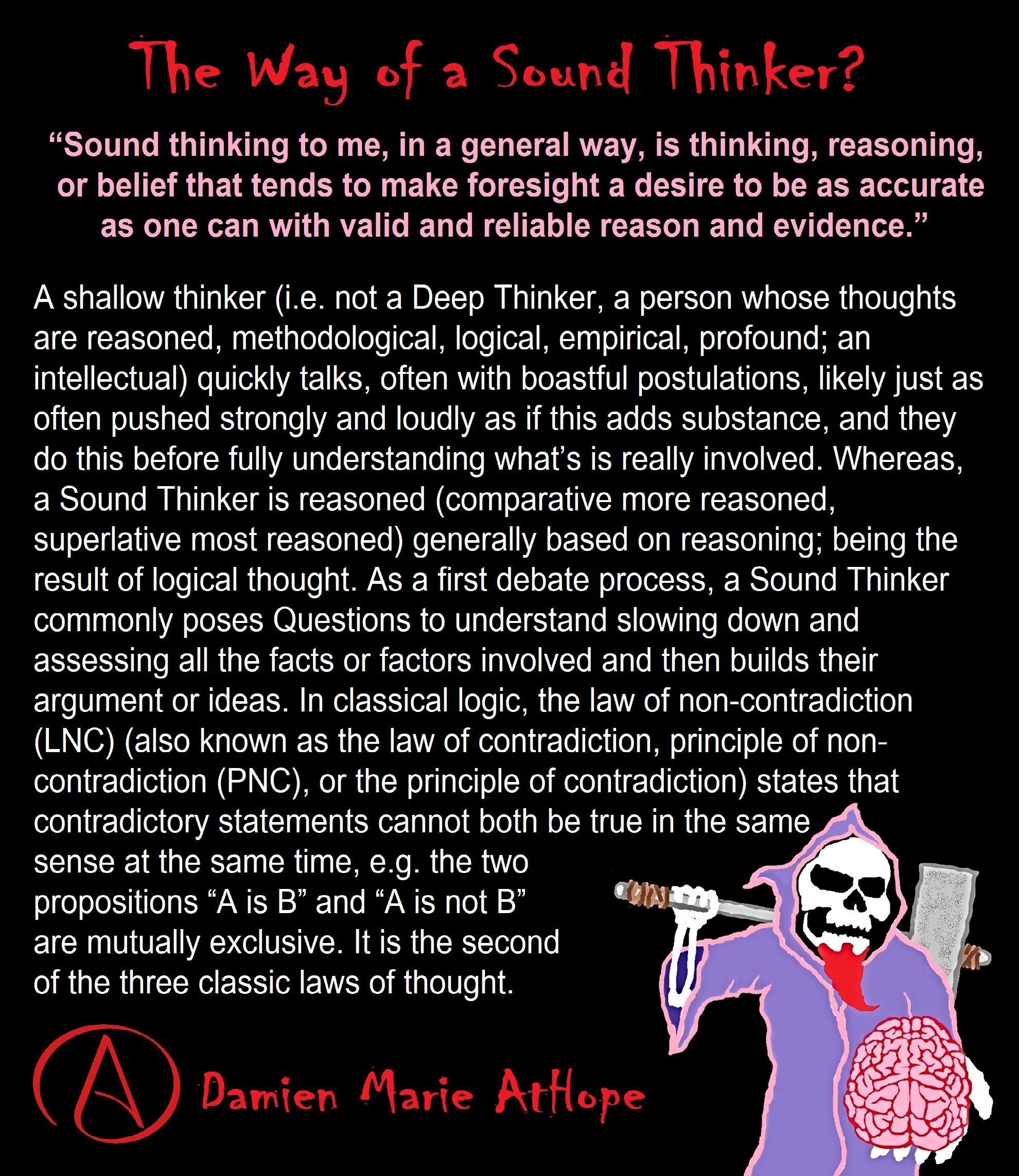
Hammer of Truth: Yes, you too, have lots of beliefs…
My Hammer of Truth (i.e. ontology, epistemology, and axiology; three philosophies that I use methodologically) both builds and destroys: it aids in building accuracy towards truth and destroy bad claims that are untrue.
So again to be clear my Hammer of Truth (i.e. ontology, epistemology, and axiology; three philosophies that I use methodologically) style is a hammer of truth that both builds and destroys: it aids in building accuracy towards truth and destroy bad claims that are untrue.
Good Belief-Etiquette (Disciplined-Rationality) (addressing The Ethics of Belief)
Addressing The Ethics of Belief and Logical Fallacies
(Damien, I hate it when people take the bible out of context!)
I don’t believe in religion, I believe in people. I don’t respect religion, I respect people. I attack bad thinking and bad behaviors, not people. I do not hate religious people, I hate the religion they are indoctrinated in and I speak out to stop the indifference to the harm religions can cause as well as the ignorance they support. Hell yes, I am against the fraud that is the world religions.
Why not be against the promotion of woo-woo pseudo-truth, when I am very against all pseudo-science, pseudo-history, and pseudo-morality and the harm they can produce. Along with the hate, such as sexism and homophobia are too often seen or the forced indoctrination of children. And this coercive indoctrination of the world religions, with their pseudo-science, pseudo-history, and pseudo-morality mainly furthered by forced Hereditary Religion (family or cultural, religious beliefs forced on children because the parent or caregiver believes that way). This is sadly done, even before a child can be expected to successfully navigate reason; it’s almost as if religious parents believe their “woo-woo pseudo-truth” lies will not be so easily accepted if they wait on a mind that can make its own choice. Because we do see how hard it is for the ones forced into Hereditary Religion.
Freedom of Religion, not Coercive Hereditary Religion freedoms
It seems difficult for them to successfully navigate reason in relation to their woo-woo pseudo-truth, found in a religion they were indoctrinationally taught to prefer, because after being instructed on how to discern pseudo-truth as truth than just wishing that their blind servitude belief in a brand of religious pseudo-truth devoid of justified, valid or reliable reason and evidence. I care because I am a rationalist, as well as an atheist. Thus, this religious set of “woo-woo pseudo-truth” pushed on the simple-minded as truth bothers me greatly. So, here it is as simple as I can make it you first need a good thinking standard to address beliefs one may approach as a possible belief warranted to be believed. I wish to smash that lying pig of religion with the Hammer of Truth: Ontology, Epistemology, and Axiology Questions (a methodological use of philosophy).
Overall, I wish to promote in my self and for others; to value a worthy belief etiquette, one that desires a sound accuracy and correspondence to the truth: Reasoned belief acquisitions, good belief maintenance, and honest belief relinquishment. May we all be authenticly truthful rationalists that put facts over faith. Calling out a liar is not the same as lying.
I am a BIG fan of the truth.
“Where did you find it?! Mankind has been diligently seeking truth since time memorial!” – Challenger
My response, Your statement is a “truth claim” right after asking about truth: “Where did you find it?! Mankind has been diligently seeking truth since time memorial! (a “truth claim” emphasized with two exclamation marks seeming to demonstrate that you believed you had said a confirmed truth. So you do believe you have found a truth while acting as if you don’t know, and seemingly by your strength of assertion, believe I guess, that no one can but here I am teaching you
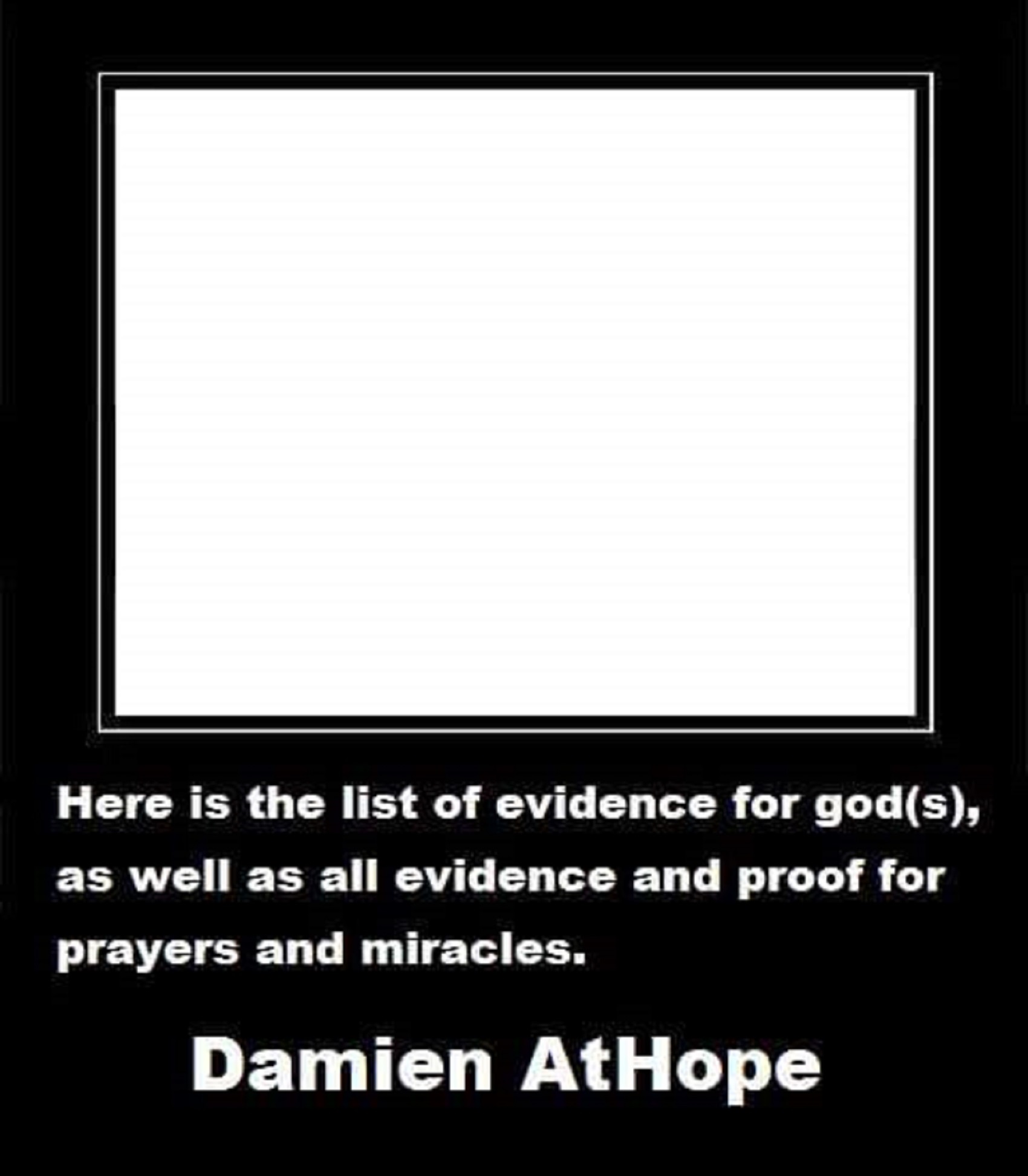
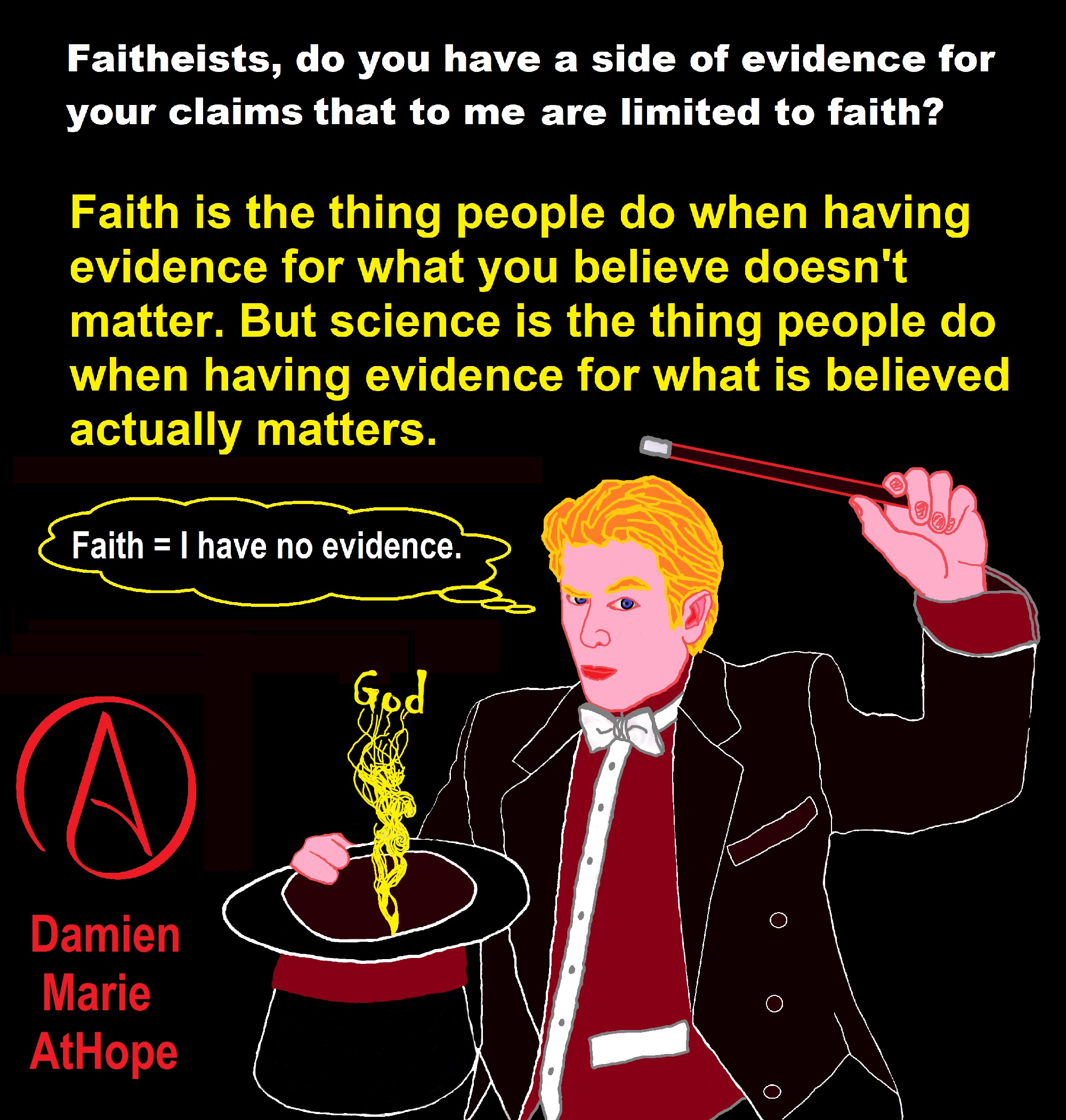
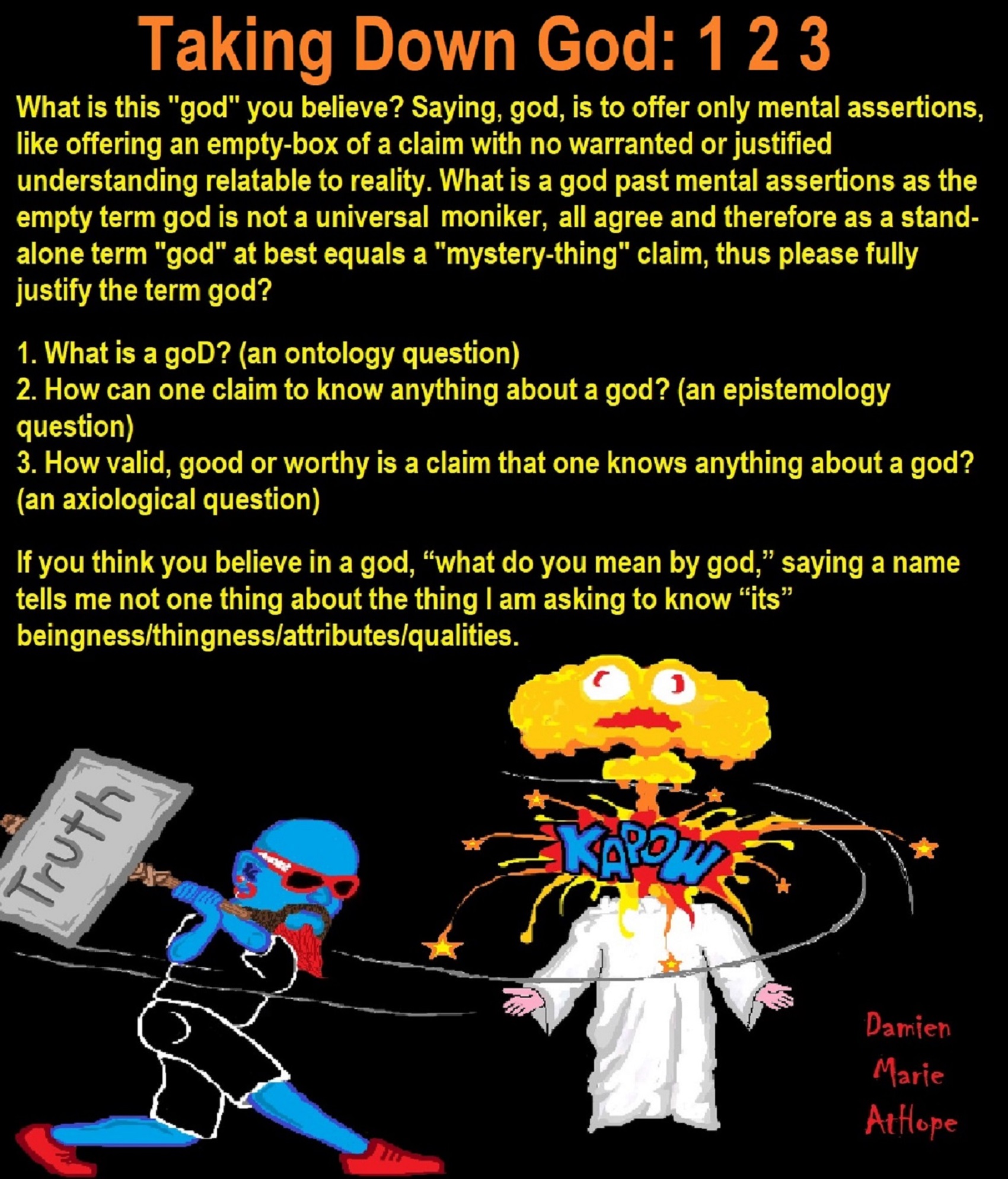
Taking down god assertions in 123
1. What is a goD? (an ontology question)
2. How can one claim to know anything about a god? (an epistemology question)
3. How valid, good or worthy is a claim that one knows anything about a god? (an axiological question)
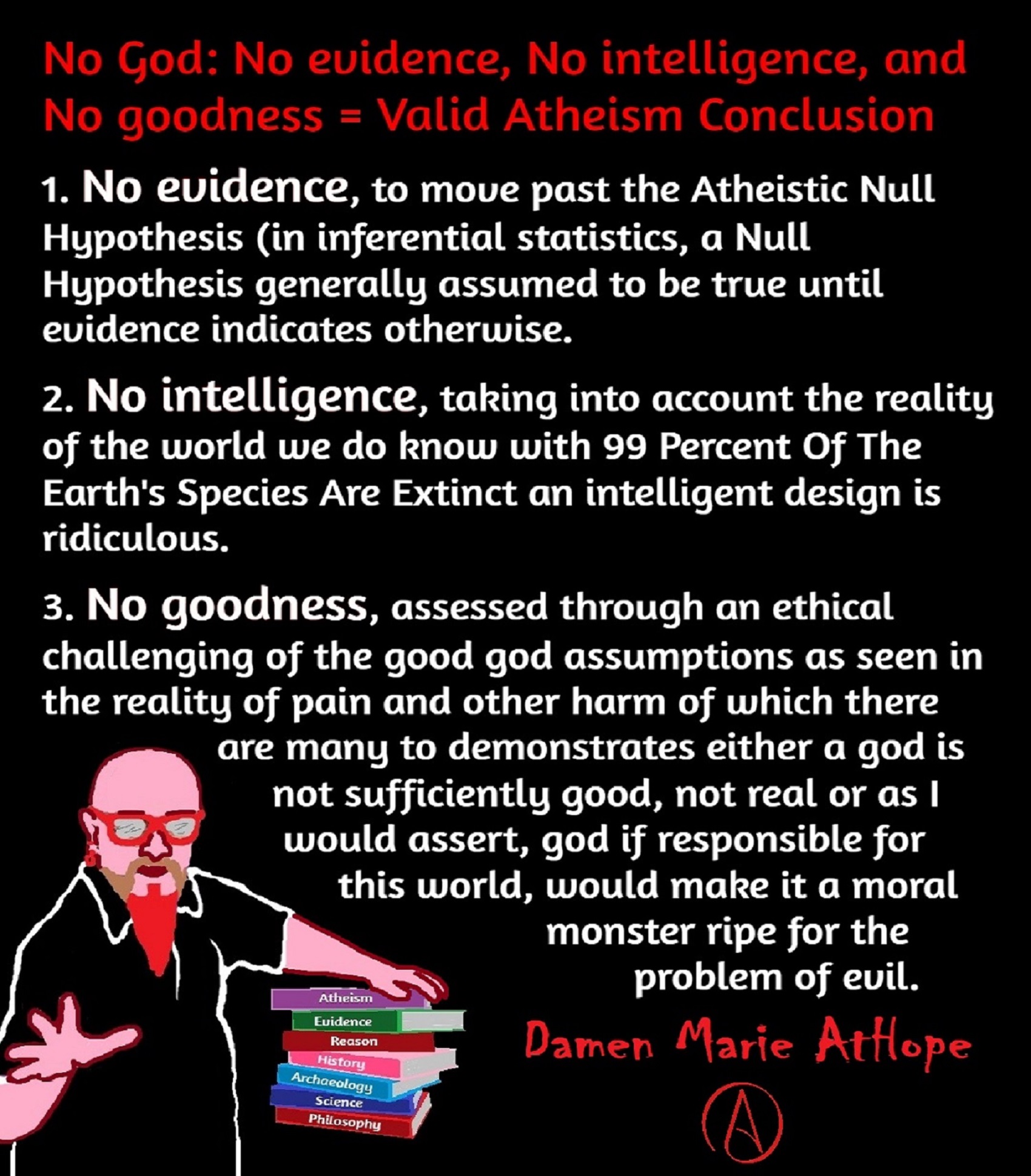
No God: No evidence, No intelligence, and No goodness = Valid Atheism Conclusion
1. No evidence, To move past the Atheistic Null Hypothesis: There is no God/Gods (in inferential statistics, a Null Hypothesis generally assumed to be true until evidence indicates otherwise. Thus, a Null Hypothesis is a statistical hypothesis that there is no significant difference reached between the claim and the non-claim, as it is relatively provable/demonstratable in reality in some way. “The god question” Null Hypothesis is set at as always at the negative standard: Thus, holding that there is no God/Gods, and as god faith is an assumption of the non-evidentiary wishful thinking non-reality of “mystery thing” found in all god-talk, until it is demonstratable otherwise to change. Alternative hypothesis: There is a God (offered with no proof: what is a god and how can anyone say they know), therefore, results: Insufficient evidence to overturn the null hypothesis of no God/Gods.
2. No intelligence, Taking into account the reality of the world we do know with 99 Percent Of The Earth’s Species Are Extinct an intelligent design is ridiculous. Five Mass Extinctions Wiped out 99 Percent of Species that have ever existed on earth. Therefore like a child’s report card having an f they need to retake the class thus, profoundly unintelligent design.
3. No goodness, Assessed through ethically challenging the good god assumptions as seen in the reality of pain and other harm of which there are many to demonstrates either a god is not sufficiently good, not real or as I would assert, god if responsible for this world, would make it a moral monster ripe for the problem of evil and suffering (Argument from Evil). God would be responsible for all pain as life could easily be less painful and yet there is mass suffering. In fact, to me, every child born with diseases from birth screams out against a caring or loving god with the power to do otherwise. It could be different as there is Congenital insensitivity to pain (CIP), also known as congenital analgesia, in which a person cannot feel (and has never felt) physical pain.

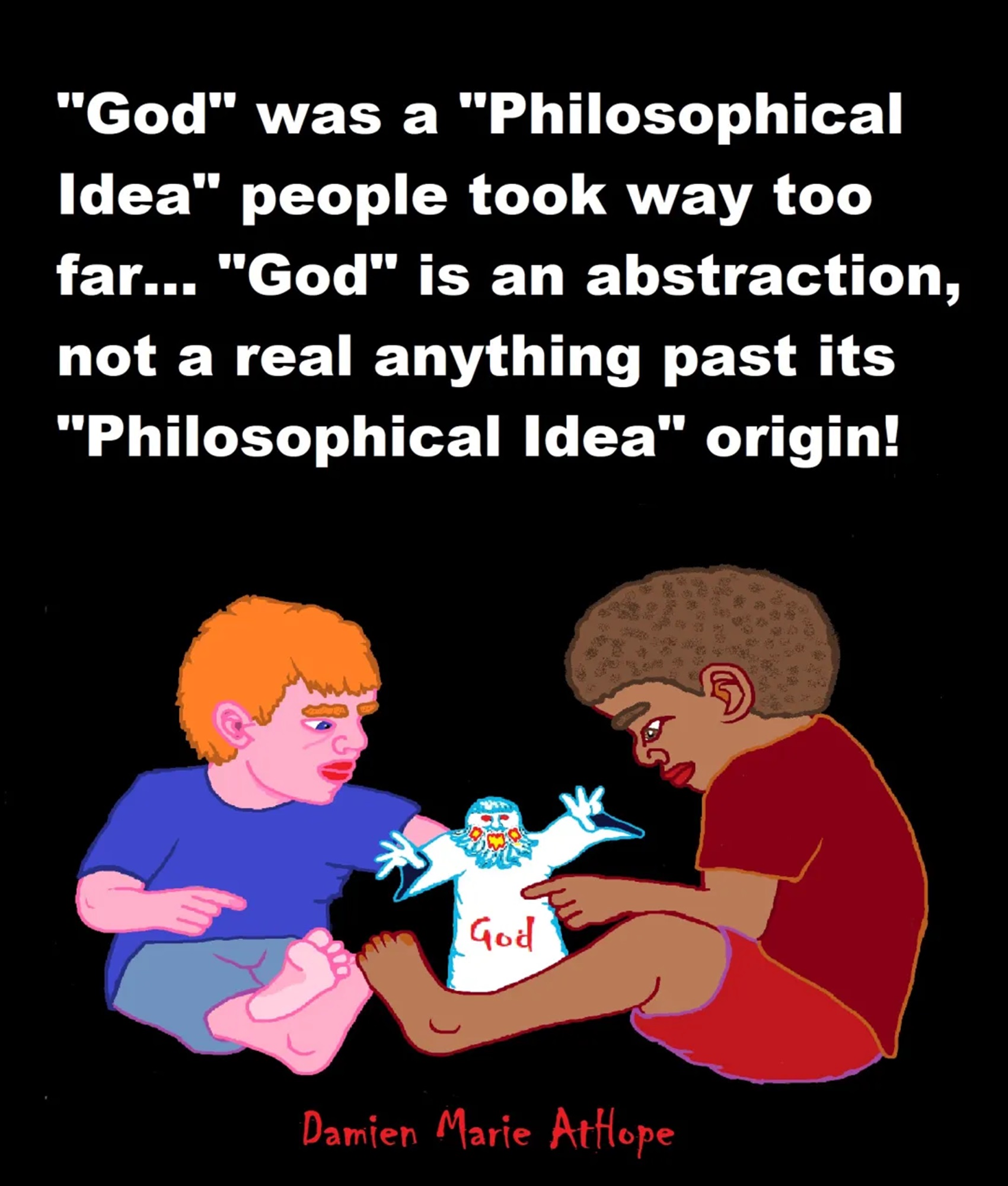
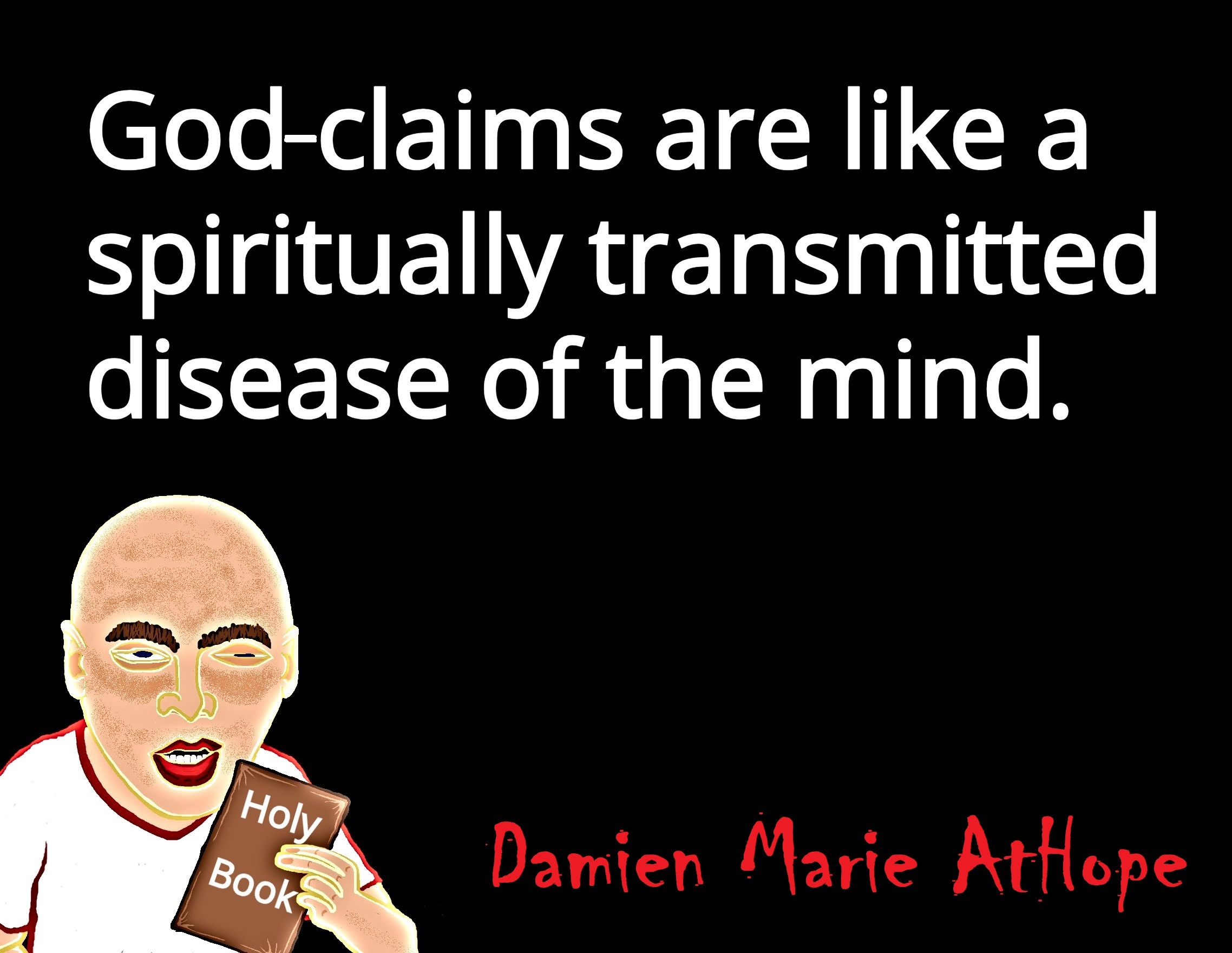
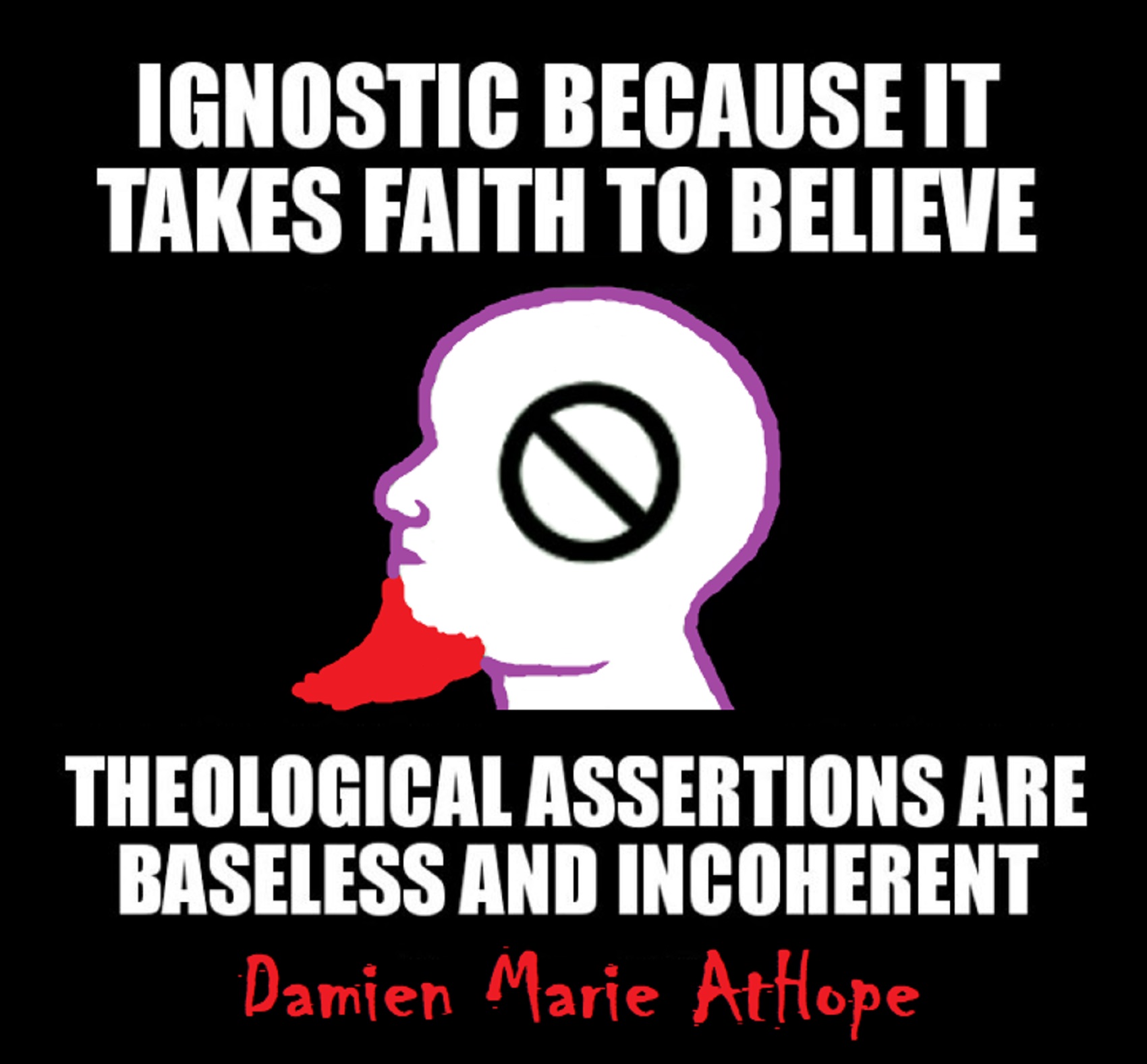
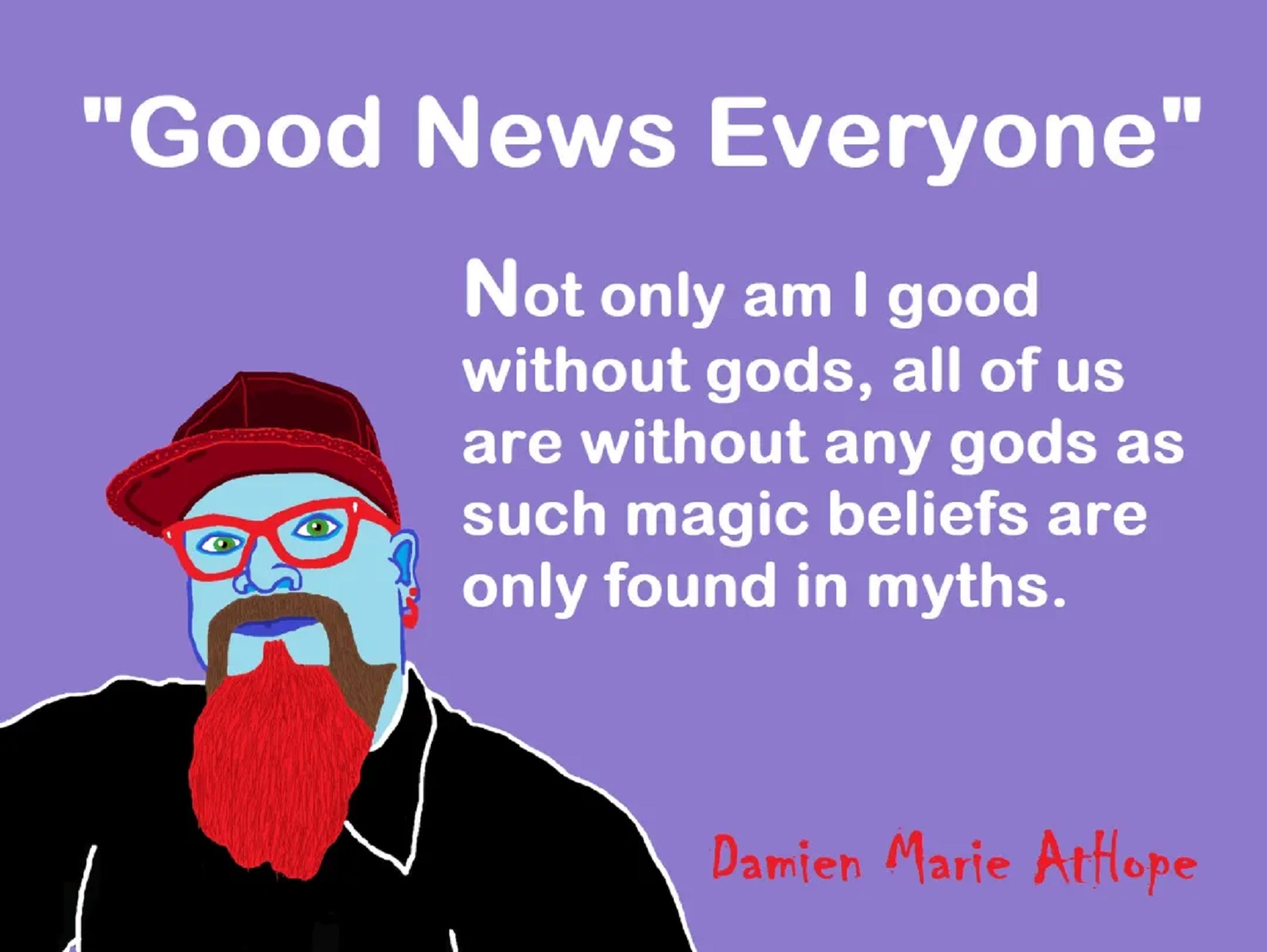
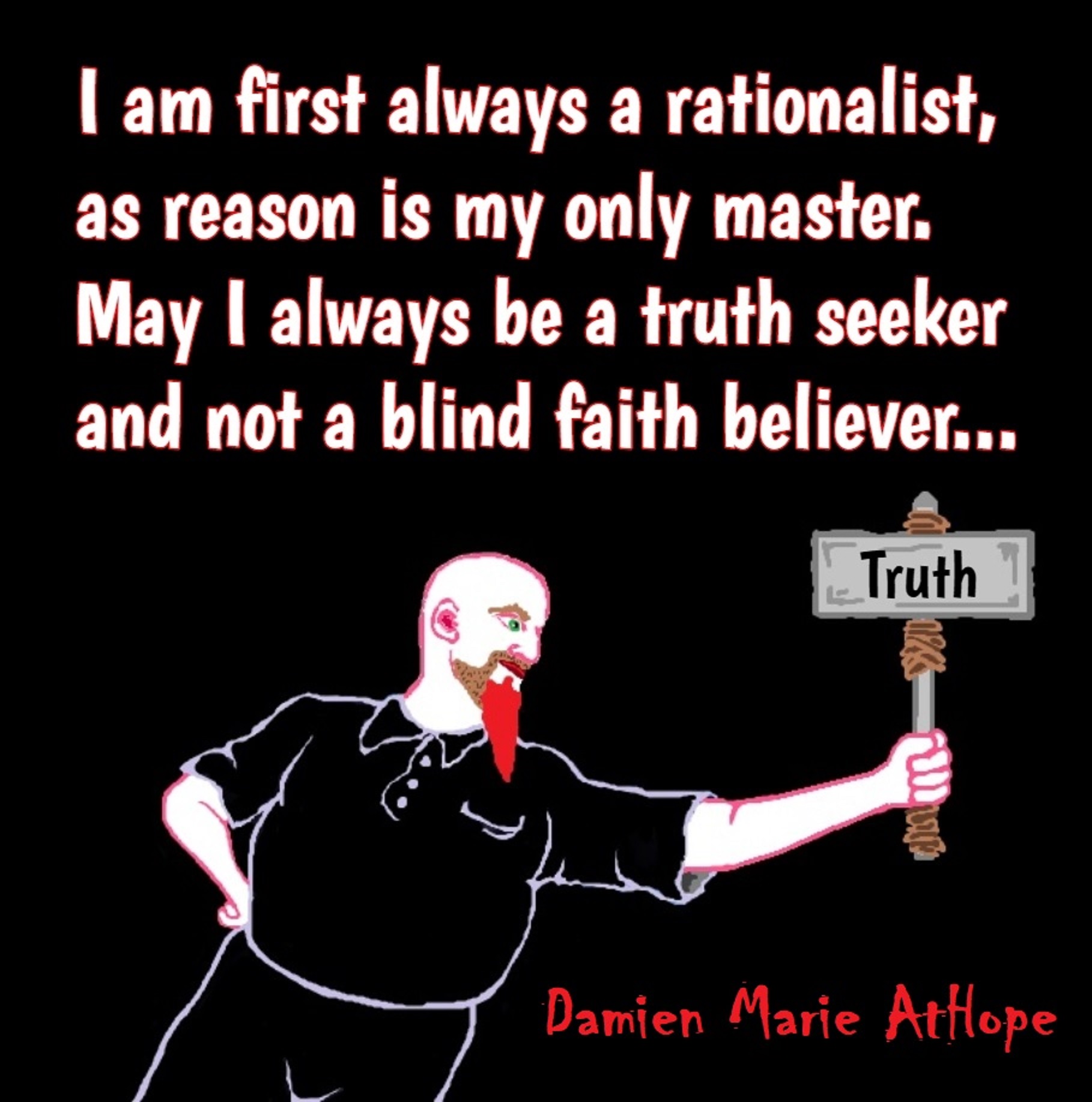
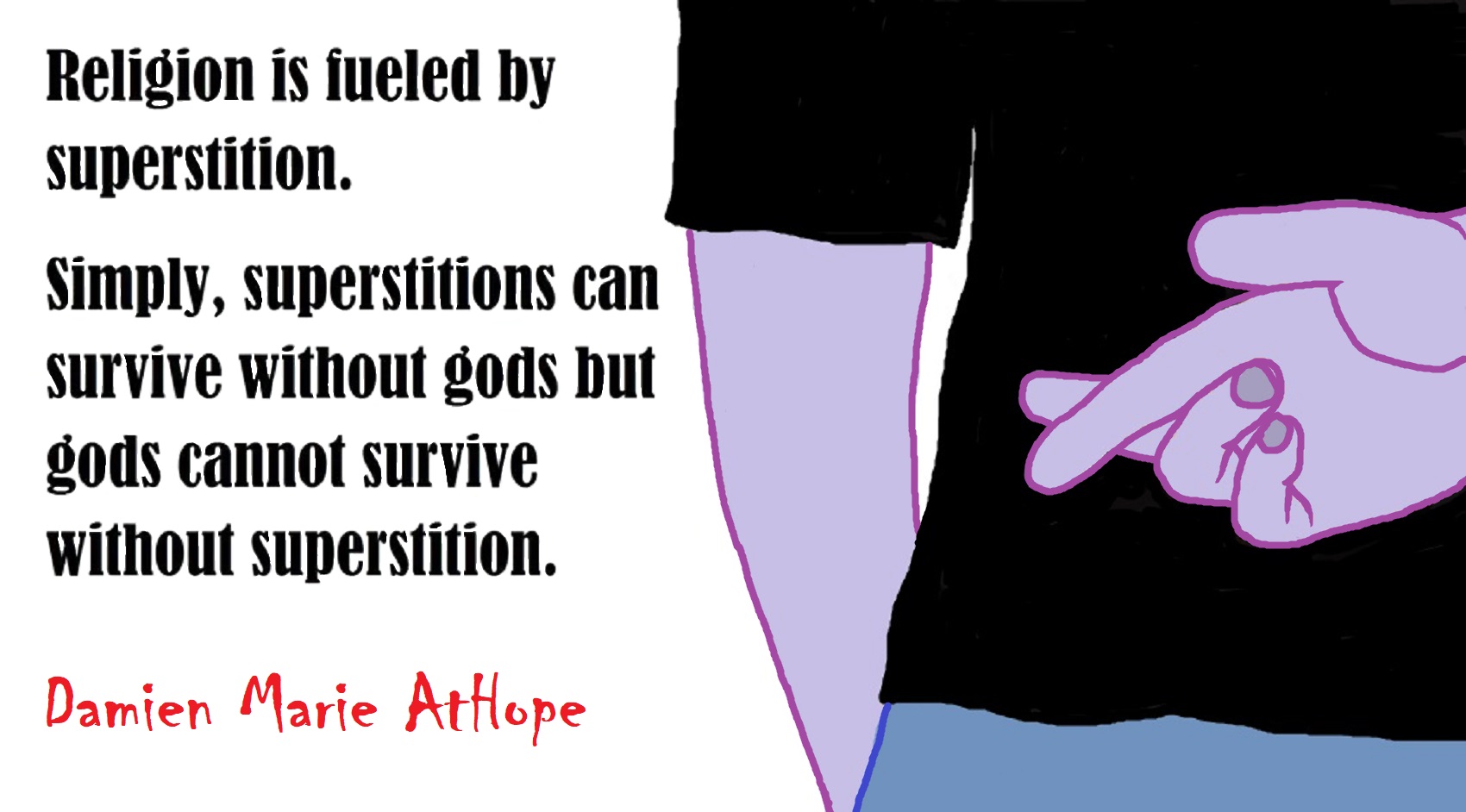
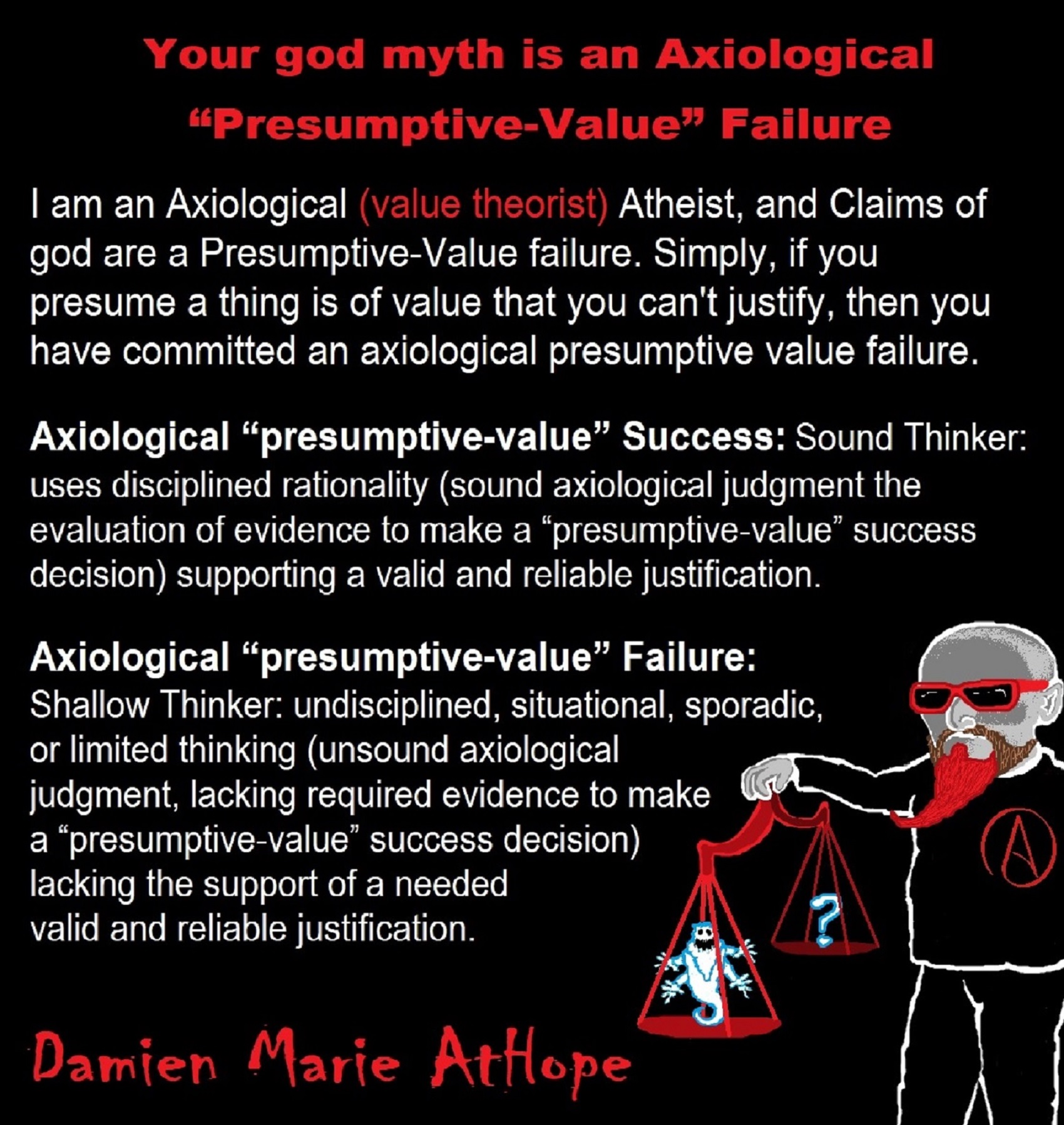
Ontology (Greek meaning ontos, “being; that which is”; and logos meaning “discourse, study, ratio, calculation, reason”) Ontology is the philosophical study of the nature of being, becoming, existence, or reality, as well as the basic categories of being and their relations.
Epistemology (Greek episteme, meaning “knowledge, understanding”, and logos, meaning “discourse, study, ratio, calculation, reason”) it is the theory of knowledge, especially with regard to its methods, validity, and scope. Epistemology is the investigation of what distinguishes justified belief from opinion.
Axiology (Greek meaning axia, “value, worth”; and logos meaning “discourse, study, ratio, calculation, reason”) it is the philosophical study of value as well as ethics and aesthetics. Formal Axiology is a specific branch of the science of Axiology. Axiology also studies of goodness, value or worth, in the widest sense of these terms. Its significance lies in the unification that it has provided for the study of a variety of questions—economic, moral, aesthetic, and even logical—that had often been considered in relative isolation.
“The Hammer of Truth” is the use of Ontology, Epistemology and Axiology questions to remove errors and add accuracy. It is also my folk name for Scientific Philosophy: Ontology, Epistemology, and Axiology”
- Hammer of Truth: Yes, you too, have lots of beliefs…
- “The Hammer of Truth” Process
- “Hammer of Truth” response to “Do you Believe in
god ?” - “The Hammer of Truth” (scientific philosophy: Ontology, Epistemology, & Axiology) in action.
- Error Crushing Force of the Dialectic Questions and the Hammer of Truth
- Truth Navigation: “Belief-Etiquette”
- Truth Navigation: Techniques for Discussions or Debates
- Truth Navigation and the fallacy of Fideism “faith-ism”
- Truth is a Value (axiological) Judgment.
- I use a kind of Dialectical Rhetoric = truth persuasion (motivational teaching)
- Methodological Rationalism (Ontology, Epistemology, & Axiology) and Skepticism
- My Methodological Rationalism: investigate (ontology), expose (epistemology) and judge (axiology)
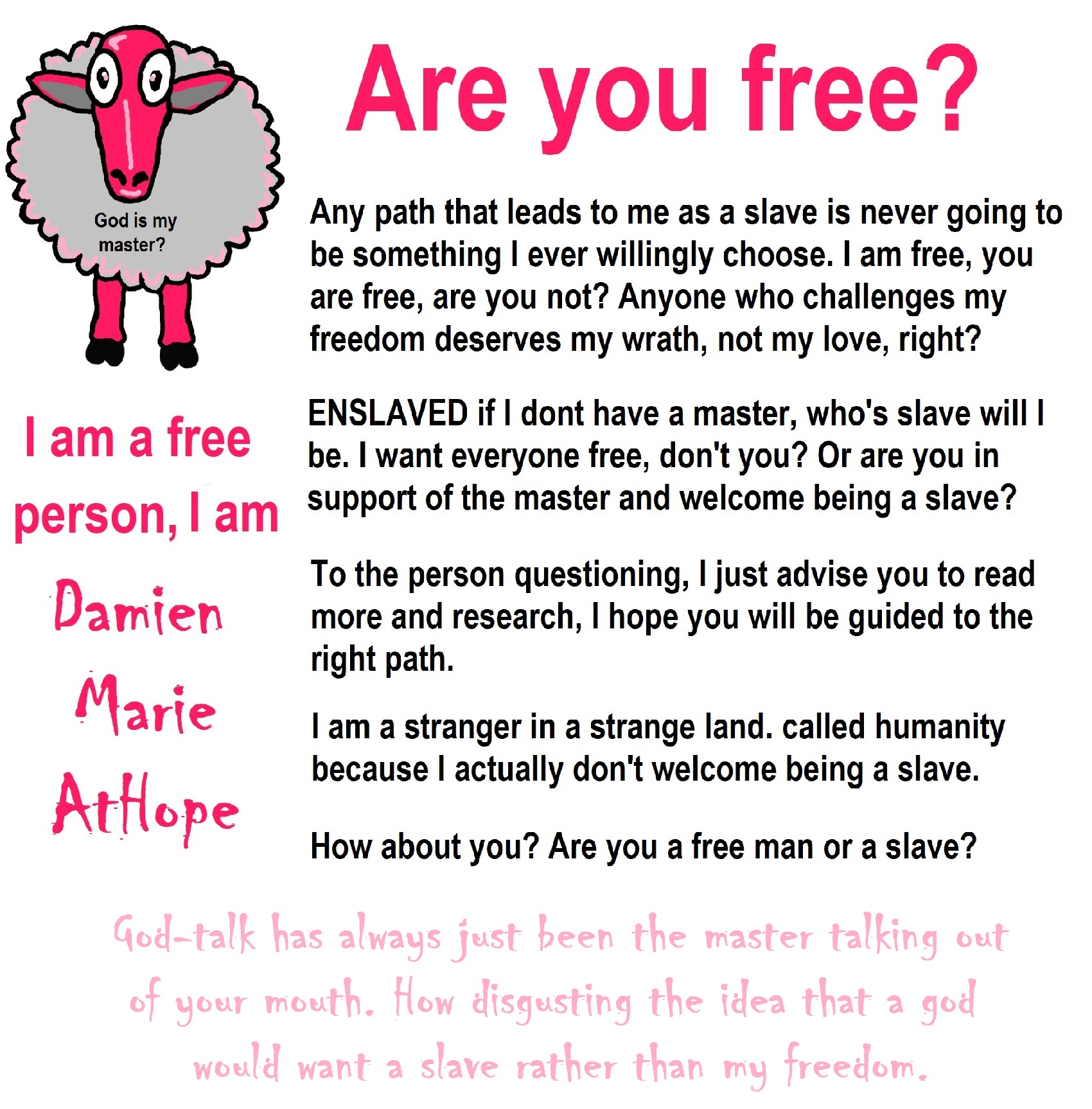
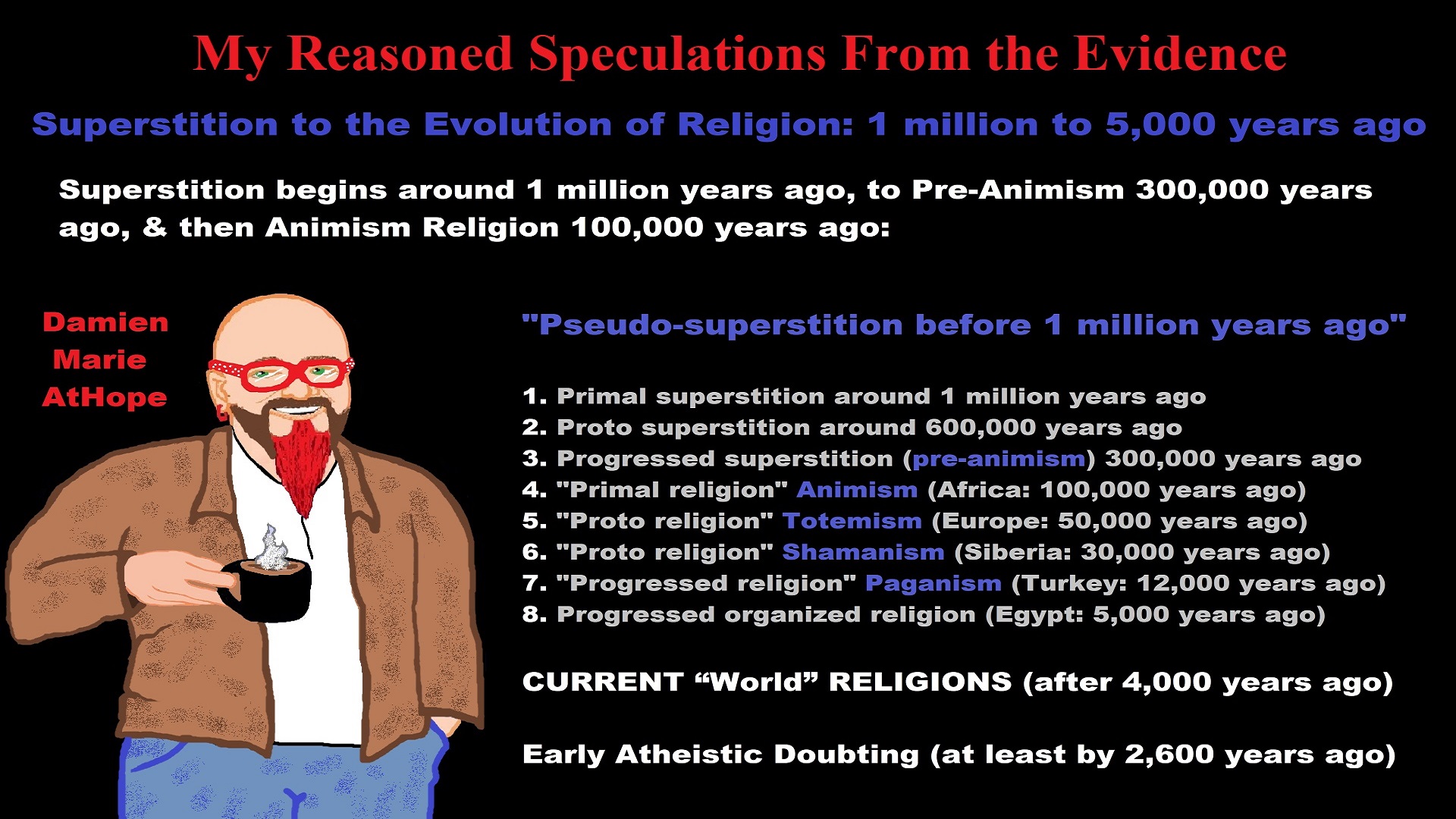
My thoughts on Religion Evolution with external links for more info:
- (Pre-Animism Africa mainly, but also Europe, and Asia at least 300,000 years ago), (Pre-Animism – Oxford Dictionaries)
- (Animism Africa around 100,000 years ago), (Animism – Britannica.com)
- (Totemism Europe around 50,000 years ago), (Totemism – Anthropology)
- (Shamanism Siberia around 30,000 years ago), (Shamanism – Britannica.com)
- (Paganism Turkey around 12,000 years ago), (Paganism – BBC Religion)
- (Progressed Organized Religion “Institutional Religion” Egypt around 5,000 years ago), (Ancient Egyptian Religion – Britannica.com)
- (CURRENT “World” RELIGIONS after 4,000 years ago) (Origin of Major Religions – Sacred Texts)
- (Early Atheistic Doubting at least by 2,600 years ago) (History of Atheism – Wikipedia)
“Religion is an Evolved Product” and Yes, Religion is Like Fear Given Wings…
Atheists talk about gods and religions for the same reason doctors talk about cancer, they are looking for a cure, or a firefighter talks about fires because they burn people and they care to stop them. We atheists too often feel a need to help the victims of mental slavery, held in the bondage that is the false beliefs of gods and the conspiracy theories of reality found in religions.
Understanding Religion Evolution:
- Pre-Animism (at least 300,000 years ago)
- Animism (Africa: 100,000 years ago)
- Totemism (Europe: 50,000 years ago)
- Shamanism (Siberia: 30,000 years ago)
- Paganism (Turkey: 12,000 years ago)
- Progressed organized religion (Egypt: 5,000 years ago), (Egypt, the First Dynasty 5,150 years ago)
- CURRENT “World” RELIGIONS (after 4,000 years ago)
- Early Atheistic Doubting (at least by 2,600 years ago)
“An Archaeological/Anthropological Understanding of Religion Evolution”
It seems ancient peoples had to survived amazing threats in a “dangerous universe (by superstition perceived as good and evil),” and human “immorality or imperfection of the soul” which was thought to affect the still living, leading to ancestor worship. This ancestor worship presumably led to the belief in supernatural beings, and then some of these were turned into the belief in gods. This feeble myth called gods were just a human conceived “made from nothing into something over and over, changing, again and again, taking on more as they evolve, all the while they are thought to be special,” but it is just supernatural animistic spirit-belief perceived as sacred.
Quick Evolution of Religion?
Pre-Animism (at least 300,000 years ago) pre-religion is a beginning that evolves into later Animism. So, Religion as we think of it, to me, all starts in a general way with Animism (Africa: 100,000 years ago) (theoretical belief in supernatural powers/spirits), then this is physically expressed in or with Totemism (Europe: 50,000 years ago) (theoretical belief in mythical relationship with powers/spirits through a totem item), which then enlists a full-time specific person to do this worship and believed interacting Shamanism (Siberia/Russia: 30,000 years ago) (theoretical belief in access and influence with spirits through ritual), and then there is the further employment of myths and gods added to all the above giving you Paganism (Turkey: 12,000 years ago) (often a lot more nature-based than most current top world religions, thus hinting to their close link to more ancient religious thinking it stems from). My hypothesis is expressed with an explanation of the building of a theatrical house (modern religions development). Progressed organized religion (Egypt: 5,000 years ago) with CURRENT “World” RELIGIONS (after 4,000 years ago).
Historically, in large city-state societies (such as Egypt or Iraq) starting around 5,000 years ago culminated to make religion something kind of new, a sociocultural-governmental-religious monarchy, where all or at least many of the people of such large city-state societies seem familiar with and committed to the existence of “religion” as the integrated life identity package of control dynamics with a fixed closed magical doctrine, but this juggernaut integrated religion identity package of Dogmatic-Propaganda certainly did not exist or if developed to an extent it was highly limited in most smaller prehistoric societies as they seem to lack most of the strong control dynamics with a fixed closed magical doctrine (magical beliefs could be at times be added or removed). Many people just want to see developed religious dynamics everywhere even if it is not. Instead, all that is found is largely fragments until the domestication of religion.
Religions, as we think of them today, are a new fad, even if they go back to around 6,000 years in the timeline of human existence, this amounts to almost nothing when seen in the long slow evolution of religion at least around 70,000 years ago with one of the oldest ritual worship. Stone Snake of South Africa: “first human worship” 70,000 years ago. This message of how religion and gods among them are clearly a man-made thing that was developed slowly as it was invented and then implemented peace by peace discrediting them all. Which seems to be a simple point some are just not grasping how devastating to any claims of truth when we can see the lie clearly in the archeological sites.
I wish people fought as hard for the actual values as they fight for the group/clan names political or otherwise they think support values. Every amount spent on war is theft to children in need of food or the homeless kept from shelter.
Here are several of my blog posts on history:
- To Find Truth You Must First Look
- (Magdalenian/Iberomaurusian) Connections to the First Paganists of the early Neolithic Near East Dating from around 17,000 to 12,000 Years Ago
- Natufians: an Ancient People at the Origins of Agriculture and Sedentary Life
- Possible Clan Leader/Special “MALE” Ancestor Totem Poles At Least 13,500 years ago?
- Jewish People with DNA at least 13,200 years old, Judaism, and the Origins of Some of its Ideas
- Baltic Reindeer Hunters: Swiderian, Lyngby, Ahrensburgian, and Krasnosillya cultures 12,020 to 11,020 years ago are evidence of powerful migratory waves during the last 13,000 years and a genetic link to Saami and the Finno-Ugric peoples.
- The Rise of Inequality: patriarchy and state hierarchy inequality
- Fertile Crescent 12,500 – 9,500 Years Ago: fertility and death cult belief system?
- 12,400 – 11,700 Years Ago – Kortik Tepe (Turkey) Pre/early-Agriculture Cultic Ritualism
- Ritualistic Bird Symbolism at Gobekli Tepe and its “Ancestor Cult”
- Male-Homosexual (female-like) / Trans-woman (female) Seated Figurine from Gobekli Tepe
- Could a 12,000-year-old Bull Geoglyph at Göbekli Tepe relate to older Bull and Female Art 25,000 years ago and Later Goddess and the Bull cults like Catal Huyuk?
- Sedentism and the Creation of goddesses around 12,000 years ago as well as male gods after 7,000 years ago.
- Alcohol, where Agriculture and Religion Become one? Such as Gobekli Tepe’s Ritualistic use of Grain as Food and Ritual Drink
- Neolithic Ritual Sites with T-Pillars and other Cultic Pillars
- Paganism: Goddesses around 12,000 years ago then Male Gods after 7,000 years ago
- First Patriarchy: Split of Women’s Status around 12,000 years ago & First Hierarchy: fall of Women’s Status around 5,000 years ago.
- Natufians: an Ancient People at the Origins of Agriculture and Sedentary Life
- J DNA and the Spread of Agricultural Religion (paganism)
- Paganism: an approximately 12,000-year-old belief system
- Paganism 12,000 years old: related to “Anarchism and Socialism” (Pre-Capitalism)
- Shaman burial in Israel 12,000 years ago and the Shamanism Phenomena
- Need to Mythicized: gods and goddesses
- 12,000 – 7,000 Years Ago – Paleo-Indian Culture (The Americas)
- 12,000 – 2,000 Years Ago – Indigenous-Scandinavians (Nordic)
- Norse did not wear helmets with horns?
- Pre-Pottery Neolithic Skull Cult around 11,500 to 8,400 Years Ago?
- 10,400 – 10,100 Years Ago, in Turkey the Nevail Cori Religious Settlement
- 9,000-6,500 Years Old Submerged Pre-Pottery/Pottery Neolithic Ritual Settlements off Israel’s Coast
- Catal Huyuk “first religious designed city” around 9,500 to 7,700 years ago (Turkey)
- Cultic Hunting at Catal Huyuk “first religious designed city”
- Special Items and Art as well as Special Elite Burials at Catal Huyuk
- New Rituals and Violence with the appearance of Pottery and People?
- Haplogroup N and its related Uralic Languages and Cultures
- Ainu people, Sámi people, Native Americans, the Ancient North Eurasians, and Paganistic-Shamanism with Totemism
- Ideas, Technology and People from Turkey, Europe, to China and Back again 9,000 to 5,000 years ago?
- First Pottery of Europe and the Related Cultures
- 9,000 years old Neolithic Artifacts Judean Desert and Hills Israel
- 9,000-7,000 years-old Sex and Death Rituals: Cult Sites in Israel, Jordan, and the Sinai
- 9,000-8500 year old Horned Female shaman Bad Dürrenberg Germany
- Neolithic Jewelry and the Spread of Farming in Europe Emerging out of West Turkey
- 8,600-year-old Tortoise Shells in Neolithic graves in central China have Early Writing and Shamanism
- Swing of the Mace: the rise of Elite, Forced Authority, and Inequality begin to Emerge 8,500 years ago?
- Migrations and Changing Europeans Beginning around 8,000 Years Ago
- My “Steppe-Anatolian-Kurgan hypothesis” 8,000/7,000 years ago
- Around 8,000-year-old Shared Idea of the Mistress of Animals, “Ritual” Motif
- Pre-Columbian Red-Paint (red ochre) Maritime Archaic Culture 8,000-3,000 years ago
- 7,522-6,522 years ago Linear Pottery culture which I think relates to Arcane Capitalism’s origins
- Arcane Capitalism: Primitive socialism, Primitive capital, Private ownership, Means of production, Market capitalism, Class discrimination, and Petite bourgeoisie (smaller capitalists)
- 7,500-4,750 years old Ritualistic Cucuteni-Trypillian culture of Moldova, Romania, and Ukraine
- Roots of a changing early society 7,200-6,700 years ago Jordan and Israel
- Agriculture religion (Paganism) with farming reached Britain between about 7,000 to 6,500 or so years ago and seemingly expressed in things like Western Europe’s Long Barrows
- My Thoughts on Possible Migrations of “R” DNA and Proto-Indo-European?
- “Millet” Spreading from China 7,022 years ago to Europe and related Language may have Spread with it leading to Proto-Indo-European
- Proto-Indo-European (PIE), ancestor of Indo-European languages: DNA, Society, Language, and Mythology
- The Dnieper–Donets culture and Asian varieties of Millet from China to the Black Sea region of Europe by 7,022 years ago
- Kurgan 6,000 years ago/dolmens 7,000 years ago: funeral, ritual, and other?
- 7,020 to 6,020-year-old Proto-Indo-European Homeland of Urheimat or proposed home of their Language and Religion
- Ancient Megaliths: Kurgan, Ziggurat, Pyramid, Menhir, Trilithon, Dolman, Kromlech, and Kromlech of Trilithons
- The Mytheme of Ancient North Eurasian Sacred-Dog belief and similar motifs are found in Indo-European, Native American, and Siberian comparative mythology
- Elite Power Accumulation: Ancient Trade, Tokens, Writing, Wealth, Merchants, and Priest-Kings
- Sacred Mounds, Mountains, Kurgans, and Pyramids may hold deep connections?
- Between 7,000-5,000 Years ago, rise of unequal hierarchy elite, leading to a “birth of the State” or worship of power, strong new sexism, oppression of non-elites, and the fall of Women’s equal status
- Paganism 7,000-5,000 years old: related to “Anarchism and Socialism” (Capitalism) (World War 0) Elite & their slaves
- Hell and Underworld mythologies starting maybe as far back as 7,000 to 5,000 years ago with the Proto-Indo-Europeans?
- The First Expression of the Male God around 7,000 years ago?
- White (light complexion skin) Bigotry and Sexism started 7,000 years ago?
- Around 7,000-year-old Shared Idea of the Divine Bird (Tutelary and/or Trickster spirit/deity), “Ritual” Motif
- Nekhbet an Ancient Egyptian Vulture Goddess and Tutelary Deity
- 6,720 to 4,920 years old Ritualistic Hongshan Culture of Inner Mongolia with 5,000-year-old Pyramid Mounds and Temples
- First proto-king in the Balkans, Varna culture around 6,500 years ago?
- 6,500–5,800 years ago in Israel Late Chalcolithic (Copper Age) Period in the Southern Levant Seems to Express Northern Levant Migrations, Cultural and Religious Transfer
- KING OF BEASTS: Master of Animals “Ritual” Motif, around 6,000 years old or older…
- Around 6000-year-old Shared Idea of the Solid Wheel & the Spoked Wheel-Shaped Ritual Motif
- “The Ghassulian Star,” a mysterious 6,000-year-old mural from Jordan; a Proto-Star of Ishtar, Star of Inanna or Star of Venus?
- Religious/Ritual Ideas, including goddesses and gods as well as ritual mounds or pyramids from Northeastern Asia at least 6,000 years old, seemingly filtering to Iran, Iraq, the Mediterranean, Europe, Egypt, and the Americas?
- Maykop (5,720–5,020 years ago) Caucasus region Bronze Age culture-related to Copper Age farmers from the south, influenced by the Ubaid period and Leyla-Tepe culture, as well as influencing the Kura-Araxes culture
- 5-600-year-old Tomb, Mummy, and First Bearded Male Figurine in a Grave
- Kura-Araxes Cultural 5,520 to 4,470 years old DNA traces to the Canaanites, Arabs, and Jews
- Minoan/Cretan (Keftiu) Civilization and Religion around 5,520 to 3,120 years ago
- Evolution Of Science at least by 5,500 years ago
- 5,500 Years old birth of the State, the rise of Hierarchy, and the fall of Women’s status
- “Jiroft culture” 5,100 – 4,200 years ago and the History of Iran
- Stonehenge: Paganistic Burial and Astrological Ritual Complex, England (5,100-3,600 years ago)
- Around 5,000-year-old Shared Idea of the “Tree of Life” Ritual Motif
- Complex rituals for elite, seen from China to Egypt, at least by 5,000 years ago
- Around 5,000 years ago: “Birth of the State” where Religion gets Military Power and Influence
- The Center of the World “Axis Mundi” and/or “Sacred Mountains” Mythology Could Relate to the Altai Mountains, Heart of the Steppe
- Progressed organized religion starts, an approximately 5,000-year-old belief system
- China’s Civilization between 5,000-3,000 years ago, was a time of war and class struggle, violent transition from free clans to a Slave or Elite society
- Origin of Logics is Naturalistic Observation at least by around 5,000 years ago.
- Paganism 5,000 years old: progressed organized religion and the state: related to “Anarchism and Socialism” (Kings and the Rise of the State)
- Ziggurats (multi-platform temples: 4,900 years old) to Pyramids (multi-platform tombs: 4,700 years old)
- Did a 4,520–4,420-year-old Volcano In Turkey Inspire the Bible God?
- Finland’s Horned Shaman and Pre-Horned-God at least 4,500 years ago?
- 4,000-year-Old Dolmens in Israel: A Connected Dolmen Religious Phenomenon?
- Creation myths: From chaos, Ex nihilo, Earth-diver, Emergence, World egg, and World parent
- Bronze Age “Ritual” connections of the Bell Beaker culture with the Corded Ware/Single Grave culture, which were related to the Yamnaya culture and Proto-Indo-European Languages/Religions
- Low Gods (Earth/ Tutelary deity), High Gods (Sky/Supreme deity), and Moralistic Gods (Deity enforcement/divine order)
- The exchange of people, ideas, and material-culture including, to me, the new god (Sky Father) and goddess (Earth Mother) religion between the Cucuteni-Trypillians and others which is then spread far and wide
- Koryaks: Indigenous People of the Russian Far East and Big Raven myths also found in Tlingit, Haida, Tsimshian, and other Indigenous People of North America
- 42 Principles Of Maat (Egyptian Goddess of the justice) around 4,400 years ago, 2000 Years Before Ten Commandments
- “Happy Easter” Well Happy Eostre/Ishter
- 4,320-3,820 years old “Shimao” (North China) site with Totemistic-Shamanistic Paganism and a Stepped Pyramid
- 4,250 to 3,400 Year old Stonehenge from Russia: Arkaim?
- 4,100-year-old beaker with medicinal & flowering plants in a grave of a woman in Scotland
- Early European Farmer ancestry, Kelif el Boroud people with the Cardial Ware culture, and the Bell Beaker culture Paganists too, spread into North Africa, then to the Canary Islands off West Africa
- Flood Accounts: Gilgamesh epic (4,100 years ago) Noah in Genesis (2,600 years ago)
- Paganism 4,000 years old: related to “Anarchism and Socialism” (First Moralistic gods, then the Origin time of Monotheism)
- When was the beginning: TIMELINE OF CURRENT RELIGIONS, which start around 4,000 years ago.
- Early Religions Thought to Express Proto-Monotheistic Systems around 4,000 years ago
- Kultepe? An archaeological site with a 4,000 years old women’s rights document.
- Single God Religions (Monotheism) = “Man-o-theism” started around 4,000 years ago with the Great Sky Spirit/God Tiān (天)?
- Confucianism’s Tiān (Shangdi god 4,000 years old): Supernaturalism, Pantheism or Theism?
- Yes, Your Male God is Ridiculous
- Mythology, a Lunar Deity is a Goddess or God of the Moon
- Sacred Land, Hills, and Mountains: Sami Mythology (Paganistic Shamanism)
- Horse Worship/Sacrifice: mythical union of Ruling Elite/Kingship and the Horse
- The Amorite/Amurru people’s God Amurru “Lord of the Steppe”, relates to the Origins of the Bible God?
- Bronze Age Exotic Trade Routes Spread Quite Far as well as Spread Religious Ideas with Them
- Sami and the Northern Indigenous Peoples Landscape, Language, and its Connection to Religion
- Prototype of Ancient Analemmatic Sundials around 3,900-3,150 years ago and a Possible Solar Connection to gods?
- Judaism is around 3,450 or 3,250 years old. (“Paleo-Hebrew” 3,000 years ago and Torah 2,500 years ago)
- The Weakening of Ancient Trade and the Strengthening of Religions around 3000 years ago?
- Are you aware that there are religions that worship women gods, explain now religion tears women down?
- Animistic, Totemistic, and Paganistic Superstition Origins of bible god and the bible’s Religion.
- Myths and Folklore: “Trickster gods and goddesses”
- Jews, Judaism, and the Origins of Some of its Ideas
- An Old Branch of Religion Still Giving Fruit: Sacred Trees
- Dating the BIBLE: naming names and telling times (written less than 3,000 years ago, provable to 2,200 years ago)
- Did a Volcano Inspire the bible god?
- Dené–Yeniseian language, Old Copper Complex, and Pre-Columbian Mound Builders?
- No “dinosaurs and humans didn’t exist together just because some think they are in the bible itself”
- Sacred Shit and Sacred Animals?
- Everyone Killed in the Bible Flood? “Nephilim” (giants)?
- Hey, Damien dude, I have a question for you regarding “the bible” Exodus.
- Archaeology Disproves the Bible
- Bible Battle, Just More, Bible Babble
- The Jericho Conquest lie?
- Canaanites and Israelites?
- Accurate Account on how did Christianity Began?
- Let’s talk about Christianity.
- So the 10 commandments isn’t anything to go by either right?
- Misinformed christian
- Debunking Jesus?
- Paulism vs Jesus
- Ok, you seem confused so let’s talk about Buddhism.
- Unacknowledged Buddhism: Gods, Savior, Demons, Rebirth, Heavens, Hells, and Terrorism
- His Foolishness The Dalai Lama
- Yin and Yang is sexist with an ORIGIN around 2,300 years ago?
- I Believe Archaeology, not Myths & Why Not, as the Religious Myths Already Violate Reason!
- Archaeological, Scientific, & Philosophic evidence shows the god myth is man-made nonsense.
- Aquatic Ape Theory/Hypothesis? As Always, Just Pseudoscience.
- Ancient Aliens Conspiracy Theorists are Pseudohistorians
- The Pseudohistoric and Pseudoscientific claims about “Bakoni Ruins” of South Africa
- Why do people think Religion is much more than supernaturalism and superstitionism?
- Religion is an Evolved Product
- Was the Value of Ancient Women Different?
- 1000 to 1100 CE, human sacrifice Cahokia Mounds a pre-Columbian Native American site
- Feminist atheists as far back as the 1800s?
- Promoting Religion as Real is Mentally Harmful to a Flourishing Humanity
- Screw All Religions and Their Toxic lies, they are all fraud
- Forget Religions’ Unfounded Myths, I Have Substantiated “Archaeology Facts.”
- Religion Dispersal throughout the World
- I Hate Religion Just as I Hate all Pseudoscience
- Exposing Scientology, Eckankar, Wicca and Other Nonsense?
- Main deity or religious belief systems
- Quit Trying to Invent Your God From the Scraps of Science.
- Archaeological, Scientific, & Philosophic evidence shows the god myth is man-made nonsense.
- Ancient Alien Conspiracy Theorists: Misunderstanding, Rhetoric, Misinformation, Fabrications, and Lies
- Misinformation, Distortion, and Pseudoscience in Talking with a Christian Creationist
- Judging the Lack of Goodness in Gods, Even the Norse God Odin
- Challenging the Belief in God-like Aliens and Gods in General
- A Challenge to Christian use of Torture Devices?
- Yes, Hinduism is a Religion
- Trump is One of the Most Reactionary Forces of Far-right Christian Extremism
- Was the Bull Head a Symbol of God? Yes!
- Primate Death Rituals
- Christian – “God and Christianity are objectively true”
- Australopithecus afarensis Death Ritual?
- You Claim Global Warming is a Hoax?
- Doubter of Science and Defamer of Atheists?
- I think that sounds like the Bible?
- History of the Antifa (“anti-fascist”) Movements
- Indianapolis Anti-Blasphemy Laws #Free Soheil Rally
- Damien, you repeat the golden rule in so many forms then you say religion is dogmatic?
- Science is a Trustable Methodology whereas Faith is not Trustable at all!
- Was I ever a believer, before I was an atheist?
- Atheists rise in reason
- Mistrust of science?
- Open to Talking About the Definition of ‘God’? But first, we address Faith.
- ‘United Monarchy’ full of splendor and power – Saul, David, and Solomon? Most likely not.
- Is there EXODUS ARCHAEOLOGY? The short answer is “no.”
- Lacking Proof of Bigfoots, Unicorns, and Gods is Just a Lack of Research?
- Religion and Politics: Faith Beliefs vs. Rational Thinking
- Hammer of Truth that lying pig RELIGION: challenged by an archaeologist
- “The Hammer of Truth” -ontology question- What do You Mean by That?
- Navigation of a bad argument: Ad Hominem vs. Attack
- Why is it Often Claimed that Gods have a Gender?
- Why are basically all monotheistic religions ones that have a male god?
- Shifting through the Claims in support of Faith
- Dear Mr. AtHope, The 20th Century is an Indictment of Secularism and a Failed Atheist Century
- An Understanding of the Worldwide Statistics and Dynamics of Terrorist Incidents and Suicide Attacks
- Intoxication and Evolution? Addressing and Assessing the “Stoned Ape” or “Drunken Monkey” Theories as Catalysts in Human Evolution
- Sacred Menstrual cloth? Inanna’s knot, Isis knot, and maybe Ma’at’s feather?
- Damien, why don’t the Hebrews accept the bible stories?
- Dealing with a Troll and Arguing Over Word Meaning
- Knowledge without Belief? Justified beliefs or disbeliefs worthy of Knowledge?
- Afrocentrism and African Religions
- Crecganford @crecganford offers history & stories of the people, places, gods, & culture
- Empiricism-Denier?
I am not an academic. I am a revolutionary that teaches in public, in places like social media, and in the streets. I am not a leader by some title given but from my commanding leadership style of simply to start teaching everywhere to everyone, all manner of positive education.


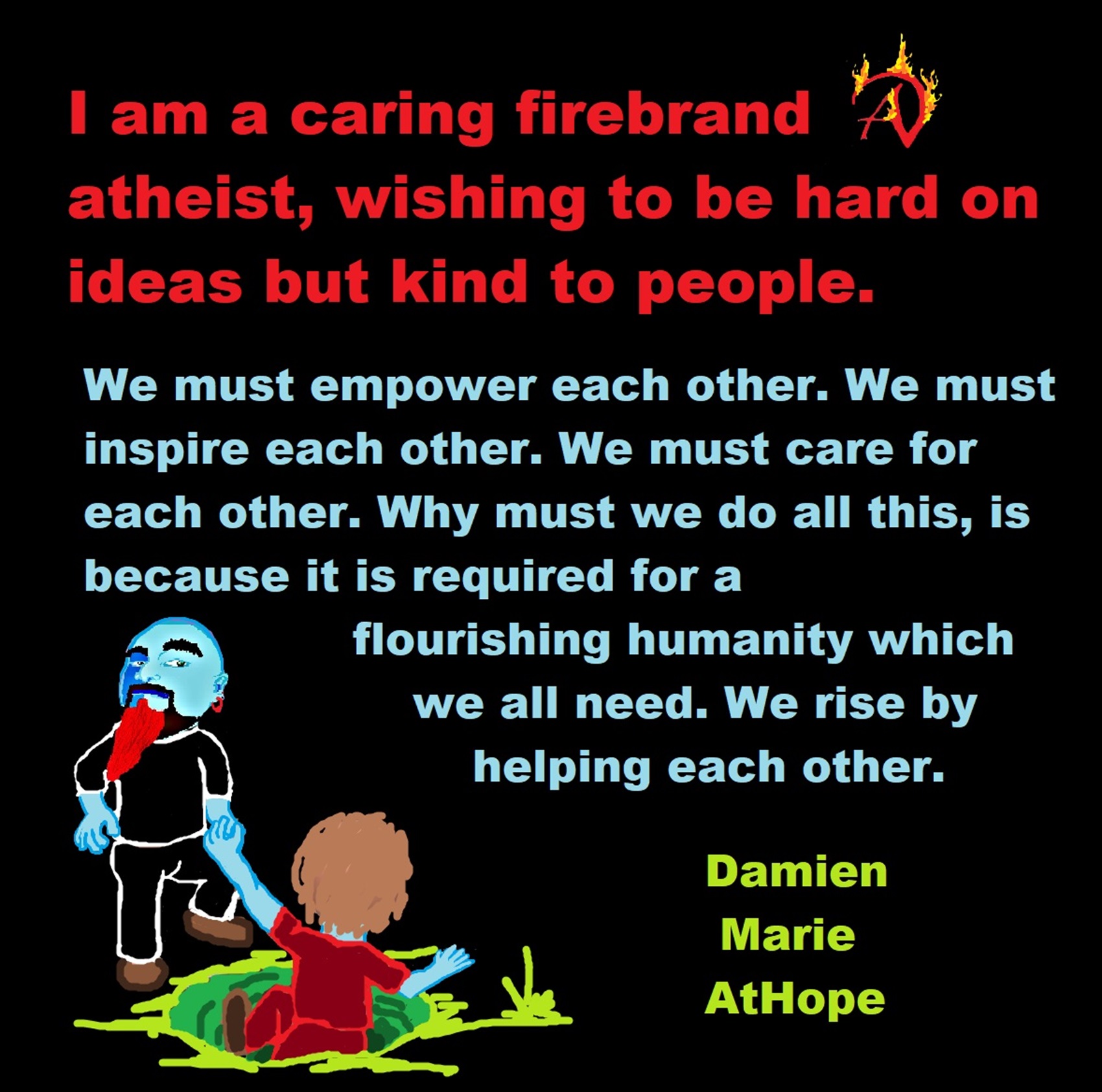

“Theists, there has to be a god, as something can not come from nothing.”
Well, thus something (unknown) happened and then there was something. This does not tell us what the something that may have been involved with something coming from nothing. A supposed first cause, thus something (unknown) happened and then there was something is not an open invitation to claim it as known, neither is it justified to call or label such an unknown as anything, especially an unsubstantiated magical thinking belief born of mythology and religious storytelling.

While hallucinogens are associated with shamanism, it is alcohol that is associated with paganism.
The Atheist-Humanist-Leftist Revolutionaries Shows in the prehistory series:
Show two: Pre-animism 300,000 years old and animism 100,000 years old: related to “Anarchism and Socialism”
Show tree: Totemism 50,000 years old: related to “Anarchism and Socialism”
Show four: Shamanism 30,000 years old: related to “Anarchism and Socialism”
Show five: Paganism 12,000 years old: related to “Anarchism and Socialism”
Show six: Emergence of hierarchy, sexism, slavery, and the new male god dominance: Paganism 7,000-5,000 years old: related to “Anarchism and Socialism” (Capitalism) (World War 0) Elite and their slaves!
Prehistory: related to “Anarchism and Socialism” the division of labor, power, rights, and recourses: VIDEO
Pre-animism 300,000 years old and animism 100,000 years old: related to “Anarchism and Socialism”: VIDEO
Totemism 50,000 years old: related to “Anarchism and Socialism”: VIDEO
Shamanism 30,000 years old: related to “Anarchism and Socialism”: VIDEO
Paganism 12,000 years old: related to “Anarchism and Socialism” (Pre-Capitalism): VIDEO
Paganism 7,000-5,000 years old: related to “Anarchism and Socialism” (Capitalism) (World War 0) Elite and their slaves: VIEDO
Paganism 5,000 years old: progressed organized religion and the state: related to “Anarchism and Socialism” (Kings and the Rise of the State): VIEDO
Paganism 4,000 years old: related to “Anarchism and Socialism” (First Moralistic gods, then the Origin time of Monotheism): VIEDO
I do not hate simply because I challenge and expose myths or lies any more than others being thought of as loving simply because of the protection and hiding from challenge their favored myths or lies.
The truth is best championed in the sunlight of challenge.
An archaeologist once said to me “Damien religion and culture are very different”
My response, So are you saying that was always that way, such as would you say Native Americans’ cultures are separate from their religions? And do you think it always was the way you believe?
I had said that religion was a cultural product. That is still how I see it and there are other archaeologists that think close to me as well. Gods too are the myths of cultures that did not understand science or the world around them, seeing magic/supernatural everywhere.
I personally think there is a goddess and not enough evidence to support a male god at Çatalhöyük but if there was both a male and female god and goddess then I know the kind of gods they were like Proto-Indo-European mythology.
This series idea was addressed in, Anarchist Teaching as Free Public Education or Free Education in the Public: VIDEO
Our 12 video series: Organized Oppression: Mesopotamian State Force and the Politics of power (9,000-4,000 years ago), is adapted from: The Complete and Concise History of the Sumerians and Early Bronze Age Mesopotamia (7000-2000 BC): https://www.youtube.com/watch?v=szFjxmY7jQA by “History with Cy“
Show #1: Mesopotamian State Force and the Politics of Power (Samarra, Halaf, Ubaid)
Show #2: Mesopotamian State Force and the Politics of Power
Show #3: Mesopotamian State Force and the Politics of Power (Uruk and the First Cities)
Show #4: Mesopotamian State Force and the Politics of Power (First Kings)
Show #5: Mesopotamian State Force and the Politics of Power (Early Dynastic Period)
Show #6: Mesopotamian State Force and the Politics of Power
Show #7: Mesopotamian State Force and the Politics of Power (Sargon and Akkadian Rule)
Show #9: Mesopotamian State Force and the Politics of Power (Gudea of Lagash and Utu-hegal)
Show #12: Mesopotamian State Force and the Politics of Power (Aftermath and Legacy of Sumer)

The “Atheist-Humanist-Leftist Revolutionaries”
Cory Johnston ☭ Ⓐ Atheist Leftist @Skepticallefty & I (Damien Marie AtHope) @AthopeMarie (my YouTube & related blog) are working jointly in atheist, antitheist, antireligionist, antifascist, anarchist, socialist, and humanist endeavors in our videos together, generally, every other Saturday.
Why Does Power Bring Responsibility?
Think, how often is it the powerless that start wars, oppress others, or commit genocide? So, I guess the question is to us all, to ask, how can power not carry responsibility in a humanity concept? I know I see the deep ethical responsibility that if there is power their must be a humanistic responsibility of ethical and empathic stewardship of that power. Will I be brave enough to be kind? Will I possess enough courage to be compassionate? Will my valor reach its height of empathy? I as everyone, earns our justified respect by our actions, that are good, ethical, just, protecting, and kind. Do I have enough self-respect to put my love for humanity’s flushing, over being brought down by some of its bad actors? May we all be the ones doing good actions in the world, to help human flourishing.
I create the world I want to live in, striving for flourishing. Which is not a place but a positive potential involvement and promotion; a life of humanist goal precision. To master oneself, also means mastering positive prosocial behaviors needed for human flourishing. I may have lost a god myth as an atheist, but I am happy to tell you, my friend, it is exactly because of that, leaving the mental terrorizer, god belief, that I truly regained my connected ethical as well as kind humanity.
Cory and I will talk about prehistory and theism, addressing the relevance to atheism, anarchism, and socialism.
At the same time as the rise of the male god, 7,000 years ago, there was also the very time there was the rise of violence, war, and clans to kingdoms, then empires, then states. It is all connected back to 7,000 years ago, and it moved across the world.
Cory Johnston: https://damienmarieathope.com/2021/04/cory-johnston-mind-of-a-skeptical-leftist/?v=32aec8db952d
The Mind of a Skeptical Leftist (YouTube)
Cory Johnston: Mind of a Skeptical Leftist @Skepticallefty
The Mind of a Skeptical Leftist By Cory Johnston: “Promoting critical thinking, social justice, and left-wing politics by covering current events and talking to a variety of people. Cory Johnston has been thoughtfully talking to people and attempting to promote critical thinking, social justice, and left-wing politics.” http://anchor.fm/skepticalleft
Cory needs our support. We rise by helping each other.
Cory Johnston ☭ Ⓐ @Skepticallefty Evidence-based atheist leftist (he/him) Producer, host, and co-host of 4 podcasts @skeptarchy @skpoliticspod and @AthopeMarie
Damien Marie AtHope (“At Hope”) Axiological Atheist, Anti-theist, Anti-religionist, Secular Humanist. Rationalist, Writer, Artist, Poet, Philosopher, Advocate, Activist, Psychology, and Armchair Archaeology/Anthropology/Historian.
Damien is interested in: Freedom, Liberty, Justice, Equality, Ethics, Humanism, Science, Atheism, Antiteism, Antireligionism, Ignosticism, Left-Libertarianism, Anarchism, Socialism, Mutualism, Axiology, Metaphysics, LGBTQI, Philosophy, Advocacy, Activism, Mental Health, Psychology, Archaeology, Social Work, Sexual Rights, Marriage Rights, Woman’s Rights, Gender Rights, Child Rights, Secular Rights, Race Equality, Ageism/Disability Equality, Etc. And a far-leftist, “Anarcho-Humanist.”
I am not a good fit in the atheist movement that is mostly pro-capitalist, I am anti-capitalist. Mostly pro-skeptic, I am a rationalist not valuing skepticism. Mostly pro-agnostic, I am anti-agnostic. Mostly limited to anti-Abrahamic religions, I am an anti-religionist.
To me, the “male god” seems to have either emerged or become prominent around 7,000 years ago, whereas the now favored monotheism “male god” is more like 4,000 years ago or so. To me, the “female goddess” seems to have either emerged or become prominent around 11,000-10,000 years ago or so, losing the majority of its once prominence around 2,000 years ago due largely to the now favored monotheism “male god” that grow in prominence after 4,000 years ago or so.
My Thought on the Evolution of Gods?
Animal protector deities from old totems/spirit animal beliefs come first to me, 13,000/12,000 years ago, then women as deities 11,000/10,000 years ago, then male gods around 7,000/8,000 years ago. Moralistic gods around 5,000/4,000 years ago, and monotheistic gods around 4,000/3,000 years ago.
To me, animal gods were likely first related to totemism animals around 13,000 to 12,000 years ago or older. Female as goddesses was next to me, 11,000 to 10,000 years ago or so with the emergence of agriculture. Then male gods come about 8,000 to 7,000 years ago with clan wars. Many monotheism-themed religions started in henotheism, emerging out of polytheism/paganism.

Damien Marie AtHope (Said as “At” “Hope”)/(Autodidact Polymath but not good at math):
Axiological Atheist, Anti-theist, Anti-religionist, Secular Humanist, Rationalist, Writer, Artist, Jeweler, Poet, “autodidact” Philosopher, schooled in Psychology, and “autodidact” Armchair Archaeology/Anthropology/Pre-Historian (Knowledgeable in the range of: 1 million to 5,000/4,000 years ago). I am an anarchist socialist politically. Reasons for or Types of Atheism
My Website, My Blog, & Short-writing or Quotes, My YouTube, Twitter: @AthopeMarie, and My Email: damien.marie.athope@gmail.com

